Juggalo Juggalo family values



16 Puppets The Chicago International Puppet Theater Festival workshops are about more than technique.
40 Early Warnings Upcoming concerts to have on your radar
40 Gossip Wolf Former bandmates of Cemetery front man Danny Gallegos remember their departed friend.
04 The To-Do Sundays on State, an exhibition at Hyde Park Art Center, and more to see and do in Chicago
06 Deglazed An online cooking show that invites local musicians to flex their food skills
08 CTA Employees share the personal cost of working inside the nation’s second-largest transit agency.

The waves
Feelings of connection and isolation haunt Space & Time’s exhibition “Water & Air.”

10 Narcan How to get the potentially lifesaving drug for free

12 Isaacs | On Culture With the Doomsday Clock at 90 seconds to disaster, we’re at the movies.
14 Cra Work An artist’s upcycling hobby gives newspaper boxes a new life.

15 Books Daniel Kraus talks about his latest novel, Whalefall
20 Escaping from the Taliban Fazel Ahad Ahadi is a pioneer of Afghan cinema and has a harrowing tale to tell.
24 Movies of Note A Compassionate Spy suffers from a dri into hagiography; H.I.M. is amateur, but sexy; and more.
26 Caporale | Juggalo family values You could learn a lot from insane clowns.

36 Shows and Records of Note Previews of concerts in the next two weeks, including Lifeguard, the Gories, Trio Imagination, and Chance the Rapper
42 Savage Love Dan Savage offers advice to some heterosexuals.
Murder, she sang
Murder, ReWrote is both sendup and homage to the beloved Angela Lansbury TV series.

44 Comics Megan Kirby dresses for self-defense success.

Society’s Children had a combo unheard-of in 60s garage rock: mother and son

TO CONTACT ANY READER EMPLOYEE, EMAIL: (FIRST INITIAL)(LAST NAME) @CHICAGOREADER.COM
CEO AND PUBLISHER SOLOMON LIEBERMAN
EDITOR IN CHIEF SALEM COLLO-JULIN
MANAGING EDITOR SHEBA WHITE
PRODUCTION MANAGER KIRK WILLIAMSON
SENIOR GRAPHIC DESIGNER AMBER HUFF
THEATER AND DANCE EDITOR KERRY REID
MUSIC EDITOR PHILIP MONTORO
CULTURE EDITOR: FILM, MEDIA, FOOD & DRINK TARYN ALLEN
CULTURE EDITOR: ART, ARCHITECTURE, BOOKS, LITERARY ARTS KERRY CARDOZA
NEWS EDITOR SHAWN MULCAHY
ASSOCIATE EDITOR AND BRANDED CONTENT SPECIALIST JAMIE LUDWIG
DIGITAL EDITOR TYRA NICOLE TRICHE SENIOR WRITERS LEOR GALIL, DEANNA ISAACS, BEN JORAVSKY, MIKE SULA
FEATURES WRITER KATIE PROUT
SOCIAL JUSTICE REPORTER DEBBIE-MARIE BROWN LISTINGS COORDINATOR MICCO CAPORALE SOCIAL MEDIA ENGAGEMENT
ASSOCIATE CHARLI RENKEN
VICE PRESIDENT OF OPERATIONS
ANN SCHOLHAMER CHIEF DEVELOPMENT OFFICER DIANE PASCAL DIRECTOR OF PEOPLE AND CULTURE
ALIA GRAHAM
MARKETING PROJECT STRATEGIST SHAWNEE DAY NEWSLETTER ASSOCIATE CHASITY COOPER
DEVELOPMENT ASSOCIATE MICHAEL THOMPSON TECHNOLOGY MANAGER ARTURO ALVAREZ OFFICE MANAGER AND CIRCULATION DIRECTOR SANDRA KLEIN
DIRECTOR OF CHICAGO INDEPENDENT MEDIA ALLIANCE (CIMA) SAVANNAH HUGUELEY
SENIOR VICE PRESIDENT OF GROWTH AND STRATEGY AMBER NETTLES VICE PRESIDENT OF SALES AMY MATHENY SALES TEAM VANESSA FLEMING, WILL ROGERS DIGITAL SALES ASSOCIATE AYANA ROLLING MEDIA SALES ASSOCIATE JILLIAN MUELLER
ADVERTISING
ADS@CHICAGOREADER.COM
CLASSIFIEDS: CLASSIFIEDS.CHICAGOREADER.COM
NATIONAL ADVERTISING VOICE MEDIA GROUP 1-888-278-9866 VMGADVERTISING.COM
JOE LARKIN AND SUE BELAIR
DISTRIBUTION CONCERNS distributionissues@chicagoreader.com 312-392-2970
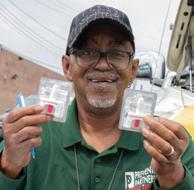
READER INSTITUTE FOR COMMUNITY JOURNALISM, INC.
CHAIRPERSON EILEEN RHODES
TREASURER REESE MARCUSSON
SECRETARY KIM L. HUNT DIRECTORS ALISON CUDDY, DANIEL DEVER, MATT DOUBLEDAY, VANESSA FERNANDEZ, TORRENCE GARDNER, ROBERT REITER, CHRISTINA CRAWFORD STEED
READER (ISSN 1096-6919) IS PUBLISHED BIWEEKLY BY THE READER INSTITUTE FOR COMMUNITY JOURNALISM 2930 S. MICHIGAN, SUITE 102 CHICAGO, IL 60616 312-392-2934, CHICAGOREADER.COM
COPYRIGHT © 2023 CHICAGO READER PERIODICAL POSTAGE PAID AT CHICAGO, IL ALL RIGHTS RESERVED. CHICAGO READER, READER, AND REVERSED R: REGISTERED TRADEMARKS ®














































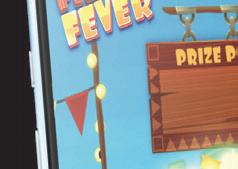














































































































Chicago offers no shortage of street festivals, but when Sundays on State debuted in 2021, it quickly won residents’ hearts with its robust and diverse o ering of activities and entertainment. From 11 AM–6 PM on Sunday, August 13, State Street will be blocked o from Lake to Adams to accommodate enough performances, workshops, and vendors to make it feel like a public party twice its size. Where else can you learn free circus skills and some history and steps unique to Mexican ballet all in one place, for free? And that’s just the start. Some other highlights include a Global Booty Dance Jam with artist and circus performer Sirene De Paradis at noon on the Randolph Stage; a show by boundary-pushing dramatists Theatre Y at 1:30 PM at the Washington Pop-Up Stage; and a performance by harmonica master Billy Branch and his band, the Sons of Blues at 5 PM on the Adams Stage. This event is open to everyone—including furry friends! (On leashes, please.) Plus, it’s in the heart of the Loop, making it easy to access from all parts of Chicago. loopchicago.com/events/sundays-on-state

On Friday, August 18, local punk label Don’t Panic Records & Distro will be celebrating its 11-year anniversary at Liar’s Club (1665 W. Fullerton). Since 2012, Don’t Panic has provided a home for some of Chicago’s most dynamic emerging DIY acts, such as the messy, reverb-infused pop-punk outfit Breathing Light and jazz-funk hip-hoppers Je’raf. Don’t Panic’s anniversary bill is stacked with local label favorites like the Cell Phones , Rat Chasm, and Heet Deth (every chance to catch Heet Deth is a treat) as well as the Seattle dance-punk trio Zookraught and New York noise rockers Venus Twins . The show kicks o at 8 PM, and it’s only $10 at the door. You must be 21 or older to attend. facebook.com/dontpanicrecords


The next day, Saturday, August 19, Out In Nature hosts a meet-up at the South Shore Nature Sanctuary (7059 S. South Shore). Out In Nature is a queer-centered group that gets people outdoors. On this adventure, volunteers will work together from 10 AMnoon removing trash from the beach and pulling invasive species to help native plants thrive. Then from noon-2 PM everyone can celebrate their hard work with a beach party. Sweating it out in the weeds is not required to enjoy beach time–but it’ll definitely make it a lot more fun! Swim, picnic, and make new friends while appreciating a gorgeous view of Lake Michigan. If you’re lucky, perhaps you’ll even spot some end-of-season plovers, too . . . southshorenaturesanctuary.org
Longtime arts educator and social practice artist William Estrada has a solo exhibition at the Hyde Park Art Center (5020 S. Cornell). In “Multiples and Multitudes,” Estrada presents a multidisciplinary practice that includes photography, prints, installations, and video, and draws on 20 years of work with a wide range of people across Chicago. He is inspired by the Chicano Art Movement and Taller de Gráfica Popular (“the People’s Graphic Workshop”)— two art historical movements led by Latine people that emphasized making art accessible and part of a political and social education.
One way this manifests is on Estrada’s bilingual YouTube channel, where he leads lessons in both Spanish and English on topics from making flyers to practicing empathy. Another is through objects produced through collaborations with students and neighborhoods.
“Multiples and Multitudes” is on view until October 29, and the Art Center is free and open to everyone seven days a week. hydeparkart.org v
mcaporale@chicagoreader.com






Deglazed is an online cooking show that invites local musicians to flex their food skills.
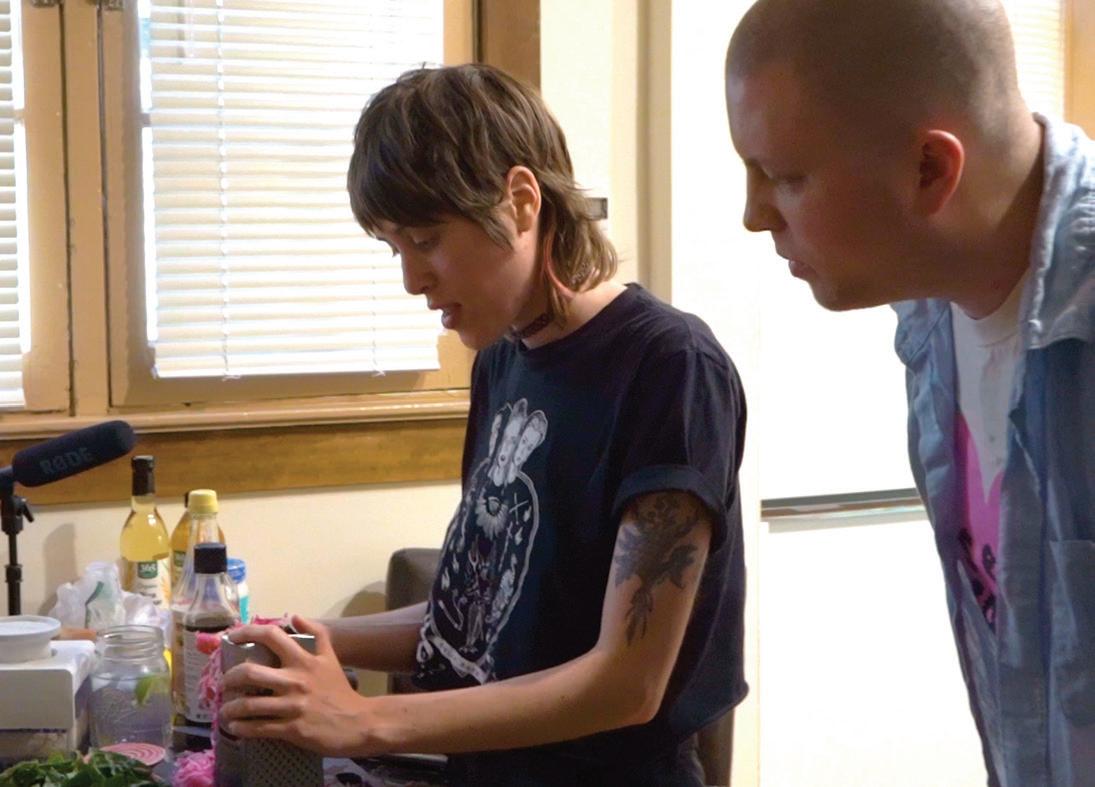 By JONAH NINK
By JONAH NINK
Punks love wa es, and Andy King has proof.
At the release show for Cut Your Losses’ self-titled debut Reflections of Ghosts at Schubas Tavern this past spring, local podcast producer and DIY chef King only had a few minutes to talk with acoustic punk artist Joe Costa, professionally known as Tourist Season, and rising punk band Shotgun Funeral before the music started.
King’s objective: finalize what both artists would be making on his online cooking and interview show, Deglazed
“I had a conversation with Syd [Sargis] and everyone from Shotgun Funeral, and they all said, ‘Yeah, we’re going to make chicken and wa es,’” King says.
“[I] go inside,” King continues. “Ask Joe, and he says, ‘We’re going to do Liège wa es.’”
It was decided there, on the Doc Martens–scu ed floor of the Schubas ballroom, that the
second season of Deglazed would kick o with the two back-to-back wa e episodes. It’s not uncommon for guest bands to throw an idea King’s way in the frantic final seconds before a set starts. You may have even overheard one of these conversations if you’re a local scene regular.
“If you see a six-foot-two guy with his arms crossed and no emotion on his face, that’s me,” King says.
A Deglazed episode will see the guest musicians work through their recipe with King at his apartment. Assisting King behind the camera are Damager vocalist and filmmaker Dan Stewart and regular music photographer Tracy Conoboy.
Cooking skill levels vary, meaning sometimes King will play sous chef as a guest flexes their cooking chops or will step in for a rescue when a dish goes sideways.
“Everybody’s coming up with their own idea; I haven’t really had to pitch a [food]
idea,” King says.
“I always try to keep things loose and conversational,” King continues. “I don’t have any interest in technical questions about instruments, gear, or anything. Seeing someone just being a person—that’s what’s interesting. That’s what people want to hear.”
Cooking is hard, especially for a novice. It’s easy to forget the little beats of frustration, horror, and triumph that come with navigating even marginally complicated recipes. These moments are the heart of Deglazed, King says.
Scene heavy hitters like OK Cool, Disaster Kid, Nora Marks, and Pinksqueeze have appeared on the show, making black bean burgers, roast duck sandwiches, and more.
“I could potentially interview one band a day for a full year and probably still wouldn’t scratch the surface of the Chicago music scene,” King says.
King started his first podcast in high school but took an extended break to attend Colum-
bia College Chicago. In 2018, King returned to podcasting for another organization before starting his own podcast network and media company, AUX, in 2019. The network is home to popular local music show The Underbelly Hours and King’s own show, AUX Populi, which highlights artists throughout the city.
“Interviewing a lot of different people, the people I’ve had the most success within conversation were bands and musicians. I just latched onto that.”
As for cooking experience?
“Not much pre-2020,” King says. “I was a bartender between 2011 through 2018. During that time, I was pretty convinced I would never be able to cook. I could put stu together, but it’s like not making fresh pasta, using boxed pasta. Not making your own sauce, using sauce out of a jar.”
He continues, “I understood bartending; I understood cocktail crafting. But I couldn’t see a ‘one to one’ with cooking because there
DEGLAZED Instagram: @deglazedshow YouTube: @deglazed auxchicago.com/deglazed
April Hickey of Pinksqueeze (le ) and Andy King on Deglazed TRACY CONOBOY







are so many more variables.”

During the dog days of 2020, a friend, the Daily Herald music writer Brian Shamie, reached out to King with an idea for a culinary challenge meant to ward o some of the boredom.

And all roads lead to waffles, it seems, at least if you’re King. “I had some leftover Belgian wa es, and he challenged me to make a breakfast sandwich,” King remembers. “That turned into me taking leftover food and recontextualizing it into a new meal.”
Mastering repurposed leftovers led to experimentation with more complicated dishes. With growing confidence in the kitchen, King wondered whether his newfound skill set could be paired with his media background.
“There’s a question in my mind of whether I started to develop this idea [for Deglazed] or if Brian Shamie also kind of gave me this idea,” King says. “Whatever the truth is, a seed was planted at one point where I thought, ‘You know, it would be fun to take all of these people that I’m interviewing on the [ AUX] podcast, or at least the ones who have expressed an interest or passion for cooking, and then do a cooking show.”
King and his team aren’t the only Chicagoans giving Food Network the finger with self-produced cooking shows. Former Hannibal Buress DJ Tony Trimm masterminds the HomeFEED show, and artist SoloSam hosts not one but two shows, Principles to Dine By and the cooking interview show House Special.
Deglazed premiered its first season in July 2022 with 11 episodes, along with Halloween, Christmas, and “Hamskiving” specials. King admits there almost wasn’t a second season.
“Last year, during the summer when we were recording, I lost all passion for cooking,” King says. “That’s the problem when you turn your hobbies and passions into work. Then it becomes work.”
King says the show’s second season, which began in June and runs through the first weeks of September, puts more focus on the human interactions that cut through the culinary chaos.

“I did not understand what the show was going to be prior to doing it,” says King. “I thought, ‘Christ, we’re going to need to fill so much time. I have to come up with segments



and di erent things.’”
He concludes, “The actual fun and freespirited conversation, that’s all the show needs to be. Attempting to make the meal look as good as possible while trying to have some sort of fun.” v


letters@chicagoreader.com
fed-up she/her to enraged she/they pipeline: because it’s inevitable, because it’s a meme which is to say that this whole poem is a morsel of something so much bigger than itself it can’t be digested without sacrifice which is to say take a shot every time a poet says “which is to say” in a poem and pour one out for every loved one you now talk about in the past tense she/they because grief gives shape to my body like nothing else, solders me into a recognizable outline for all my hollow, all my they (she) and her (them), all my unfinished, which is to say that poets are so good at transfiguration a poem that begins with an internet joke turns into something else entirely like the girl that lives in my clenched jaw and the grooves in my palms is spiraling beyond comprehension because it’s inescapable, because it’s a one-liner my pronouns are (constantly repressing rage) she/her clinging to sharp edges my pronouns are (irreparably expansive) they, they, they holding hands in the Botanic Gardens, they running towards the Lake in winter so she’ll remember the biting clarity of aliveness in her lungs, they crying on the Red Line swaddled in her warmest coat: she/here against all burdens they/when all the skin is shed which is to say this is an offering to a future me/I’m no longer waiting for permission
 By Christian Aldana
By Christian Aldana
Christian Aldana (she/they) is the author of The Water We Swim In (Sampaguita Press, 2023) They are a queer, Filipinx, artist, educator and community organizer based in Chicago. She is the founder and Creative Director of Luya, a poetry organization that centers the voices of people of color.
This Poetry Corner is curated by Raych Jackson. Rachel “Raych” Jackson is a writer, educator and voice actor. Her poems have gained over 2 million views on YouTube and have been published by many— including Poetry Magazine, The Rumpus, The Shallow Ends, and Washington Square Review. She co-created and co-hosts Big Kid Show, a monthly variety show in Chicago. Raych’s debut collection EVEN THE SAINTS AUDITION (Button Poetry) won Best New Poetry Collection by a Chicagoan in the Chicago Reader fall of 2019. RAYCH-JACKSON.COM
A biweekly series curated by the Chicago Reader and sponsored by the Poetry Foundation.














erators. As reported by Block Club Chicago, the agency has implemented $1,000 signing bonuses and a Second Chance Program to try and boost hiring. Yet an April WBEZ analysis found that the CTA was still losing more employees than it was hiring. A FOIA request for previous resignation numbers is pending.
Poor bathroom access, shortened recovery times, and safety concerns impact employee morale and, by extension, the commuter experience.
By MOLLY BOOKNERAround 3:30 AM, Aundra Thompson, 57, wakes to his phone’s alarm clock. Outside, darkness cloaks the sleepy Forest Park community in which he resides. Unlike some Chicagoans, Thompson doesn’t have the luxury of repeatedly hitting the snooze button; local bus riders depend on his timeliness. Plus, being even slightly late has consequences.
Reinvigorated by a hot cup of co ee from a local food truck, Thompson begins his fi rst task: carefully inspecting every facet of the multi-wheeled bus, ensuring not only the behemoth’s mechanical soundness but the comfort of his upcoming passengers. Perhaps most importantly, before starting the bus, he searches its underbelly for unhoused people who might’ve fallen asleep there.
Since the 1980s, Thompson has held various positions within the Chicago Transit
Authority (CTA), but lately, he’s become increasingly disillusioned. Deteriorating working conditions affect his physical and mental health, he said, and he frequently works overtime just to make ends meet.
Currently, the agency faces a formidable challenge to eliminate obstacles fueled by the pandemic, which have slowly eroded its dependability. Daily delays continue to frustrate and demoralize riders, while “ghost” buses and trains exacerbate perceptions of incompetence and unreliability. As attention focuses heavily on the rider experience, the concurrent struggle of the agency’s most vital organ—its workers—often slips into the shadows.
Data obtained through the Freedom of Information Act (FOIA) confi rms that 160 CTA employees had resigned this year as of April 20, including 11 who were out on temporary medical disability. Seventy-one were bus op-
Thompson and four colleagues discussed some key factors contributing to the agency’s service limitations and sta shortages. These insights touched upon diverse issues including inadequate bathroom access and problems with a widely lauded initiative aimed at providing opportunities for people who have previously encountered barriers to employment. Ultimately, the employees underscored a connection between the worker experience and the service issues tormenting commuters.
“The hardworking men and women of the CTA are under attack,” Thompson said.
As he approaches the end of a bus route, Thompson often seeks out a restroom, a fairly simple task that has long caused him and other operators distress, he said.
“Some of the bathrooms are just deplorable,” Thompson said. “Not fit for a dog.”
He’s referring to the portable toilets the CTA has placed at the ends of some bus lines. According to Thompson and other operators, these bathrooms can be dirty and located in dark, isolated areas. Sometimes, the locks don’t work, he and his colleagues said, making them feel unsafe. Using a porta-potty during colder months, when thermostats often dip below zero degrees, can be especially harrowing, Thompson said.
“Put yourself in my place real quick,” he said. “It’s 15 degrees below zero. It’s dark. There’s nothing out there. You want to wash your hands after you go . . . How di cult do you think that will be if there’s no water because the water is frozen? If all the employees was white, they wouldn’t have no problems.”
In 2021, nearly 70 percent of all CTA employees were Black or African American, according to official agency documents. Given Chicago’s long history of racism and disinvestment in marginalized communities, Thompson’s assertion underscores some of the challenges faced by non-white workers.
Fed up with the lack of proper restrooms, some operators relieve themselves behind the buses, Thompson said. “This is a lack of dignity to a group of human beings who deserve better.”
Thompson’s colleague, a 25-year CTA veteran who wished to remain unnamed for
fear of retaliation, said she only chooses bus routes with proper bathrooms on each end. Due to her seniority, she has more control over her schedule and routes. However, she empathizes with those who must use the portable bathrooms.
“[The CTA is] a multimillion-dollar company; if that’s the best they could come up with for their employees, shame on them,” she said.
CTA employees and news reports have claimed some workers wear diapers to avoid using porta-potties, although it’s unclear how widespread this practice is.
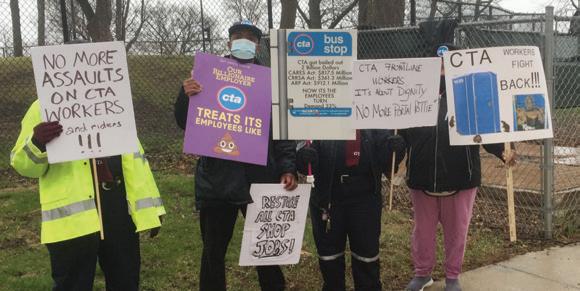
CTA spokesperson Maddie Kilgannon said that the “CTA has worked hard to ensure that every bus and rail operator has access to several restroom facilities along their routes.” In addition to facilities at every bus garage and rail terminal, the CTA has secured access to nearly 100 other permanent restrooms, she said, including retail stores, commercial buildings, and other locations throughout the service region.
However, some workers said they drive buses at hours when many businesses are not open. Furthermore, many of these businesses have restricted bathroom access to paying customers in response to the COVID-19 crisis, the operators said. If an operator urgently requires a restroom, that driver must safely pull over near the chosen bathroom, call the control center, and inform the bus’s passengers, Thompson’s colleague said.
Although some workers maintain that the portable restrooms often appear dirty, Kilgannon said they are “cleaned and serviced on a regular basis.” While she didn’t specify how often that occurs, she explained that constructing permanent restroom facilities would be logistically and financially challenging because bus routes change often.
Beyond cleanliness and comfort, one of the core issues regarding bathrooms that directly a ects service, Thompson said, is that operators often lack su cient time to use them.
Previously, workers had about 15 to 20 minutes at the end of a line to recuperate, tend to personal business, drink water, and prepare for the next run, Thompson said. Today, those periods, known as recovery times or layovers, have been reduced to only a handful of minutes, the bus operator said. Various CTA run schedules obtained by the Reader confi rm that current recovery periods sometimes last around five or six minutes, occasionally even less.
“We[’re] just like rippin’ and runnin’
from one end to another like a rabbit,” Thompson said.
Per the agency’s collective bargaining agreement with its local #241 and #308 unions, the longest period any employee can work without a break is five and a half hours, Kilgannon said, in which case the employee will have either a 30- or 60-minute break as part of their picked schedules. Yet outside of required lunch periods, operators don’t receive formal breaks, Thompson’s colleague said, meaning they typically use those layovers to quickly tend to personal matters.
Representatives from neither union responded to repeated requests for comment.
Brandon McFadden, a cybersecurity analyst who tracks CTA train arrivals and is familiar with bus service levels, said that recovery times have shortened because of overbooked schedules.
For bus operator Robert, who asked to withhold his last name for fear of retaliation, packed schedules are nothing unusual. “The CTA is squeezing more and more and more and more and more work out of the operator’s day,” he said.
The result, four employees said, is frequently delayed buses.
If a driver requires even a few extra minutes to use the restroom or tend to other personal matters, that driver risks being late to the next stop, prompting some to try and make up time before sparking a domino e ect.
Regarding recovery time, Kilgannon said, “The recovery time/layover at the end of each trip is to keep service on schedule if the trip gets delayed along the route for unforeseen circumstances.” Additionally, she said that while some routes saw average layover times decrease due to recent schedule optimization e orts, average layover time increased overall and systemwide. CTA began introducing optimized rail schedules in late October 2022 and optimized bus schedules in January 2023. Kilgannon also clarified that “layover time is not considered an o cial break.”
While inadequate bathroom facilities and shortened recovery times significantly lower employee morale and negatively impact service, the day-to-day issues take a back seat to safety concerns, which profoundly a ect the workers interviewed.
Thompson worries deeply about workrelated dangers, so much so that he said he’s developed anxiety, often lying awake at night wondering, “Will I get hurt tomorrow?”
While Thompson didn’t specify whether he
has been injured at work previously, he said many workers quit in response to the stresses and dangers of the job.
Dealing with agitated, disorderly passengers is not uncommon, said the workers interviewed, nor is receiving threats from those under the influence of substances or who are otherwise impaired. Occasionally, passengers become aggressive, putting the operator and fellow riders at risk. Vehicle delays and fare disagreements tend to exacerbate this kind of behavior, the workers noted.
When asked about violence prevention training, Kilgannon responded that bus and rail operators partake in various training modules upon being hired. These include: “the role of an operator, CTA customer service standards, confl ict management/problem solving, safety awareness, activation of silent alarm and bus safety barrier, and more,” she said.
As attacks targeting transit workers rise nationally, the Chicago Transit Justice Coalition (CTJC), an alliance of bus and train operators, is advocating for stricter safety measures.
In addition to brick-and-mortar bathrooms, 24-hour employee cafeterias, day cares, and free health insurance, one of the group’s most pressing demands is for the CTA to implement a policy mandating two-person crews for all vehicles—prioritizing train crews—to increase workers’ protection and give apprentices more learning opportunities. With two-person crews, one worker can focus on operating the train while the other can monitor the cars for unsafe behavior and assist with other tasks as needed.
Railcar repairman Eric Basir, an outspoken CTJC organizer and union steward, said one-person crews make it di cult for workers to properly prepare their trains for trips. Bolstering such crews amid staffing shortages could involve organizing Chicagoans and redirecting tax revenue from “war and the prison industrial complex” toward public transportation, Basir said.
“As it is currently with one operator, if we follow all procedures ‘by the book,’ the delays would cripple the entire system,” he said. Although Basir is a steward, he speaks on behalf of himself and the CTJC, not the union.
According to an official CTA document outlining the “duties and responsibilities’’ of rapid transit operators, such workers must complete dozens of steps to prepare their trains for service. These steps range from testing the windshield wipers and horns to
locating and inspecting the motor cabs’ fi re extinguishers. However, it’s physically “impossible” for rail operators to complete all these required checks without an additional set of hands or increased time at terminals, Basir said.
These demands, along with various others, were drafted by the CTJC in a two-goal report in response to Mayor Brandon Johnson’s 223-page transition report, which includes various objectives to make the city more equitable for all.
For the CTA, the safety of employees and customers is the agency’s fi rst priority, said spokesperson Kilgannon. Regarding crime, Kilgannon said that according to the Chicago Police Department, during April, violent crime on the CTA was down 14 percent month to date and 6 percent year to date from the previous year. Overall transit crime is down 9 percent year to date and 15 percent compared to April 2022.
Additionally, Kilgannon said the agency this year added resources to help complement CPD’s crime-prevention efforts and is continually seeking new ways to expand and improve upon its efforts. While she didn’t specify the details of these newly added resources, she highlighted a Safety Committee formed in 2022 composed of CTA managers, union o cials, and employees to foster “open and collaborative dialogue.”
Repairman Basir also addressed the agency’s Second Chance Program, which, according to the CTA’s website and collective bargaining agreement, requires apprentices—the title given to Second Chance participants—to work up to 40 hours per week for about a year at minimum wage with no sick days, vacation days, or holidays off. While apprentices receive some perks, like paid commercial learner’s permit training; free transportation on CTA, Metra, and Pace; and professional development opportunities; per Kilgannon, they do not receive medical insurance, retirement plan benefits, or paid family leave. Additionally, as stated on the agency’s website, Second Chance workers must “be available to work any shift assigned at any location (CTA is a 24-hour operation).”
“I think people who are incarcerated should get a second chance at employment,” operator Robert said, “but don’t put them in a position to go back. . . . Who can live o of $15.40 an hour?”
One apprentice, Mark, who asked that his last name be withheld, expressed disappointment with the program. After serving time
in prison, Mark said being accepted into the Second Chance Program felt like “winning the lottery.” However, an inability to progress or graduate has prompted him to search for work elsewhere, he said. He added that due to his limited salary, he cannot afford a phone line and relies on a friend’s. Email records confirm Mark’s unsuccessful applications for permanent CTA positions, though the reasons for these rejections could not be verified.
“You know what happens when you graduate from the Second Chance program?” Mark said. “You graduate to the unemployment line.”
Kilgannon said the CTA could not publicly comment on Mark’s case but that the Second Chance Program “has provided unprecedented opportunities for people to get their lives back on track.” To date, hundreds of participants have secured permanent CTA positions, Kilgannon said, with some having risen through the ranks to management positions. Others, she added, have found success in the private sector following their time at the agency.
Mark maintains that the CTA intended to use him as cheap labor and said he wishes the agency had been more transparent. If the program’s focus was cleaning, not career advancement, Mark said, the agency “should’ve put that on the fl iers.”
The workers interviewed suggested several agency improvements, including updating communication systems, prioritizing the well-being of existing workers, and increasing fi nancial incentives.
Kilgannon acknowledged that in an organization with nearly 11,000 employees, communication always needs improvement. She also stated that the CTA o ers a competitive salary compared to other transportation agencies, such as Metra and Pace, from which many CTA workers transfer.
Ultimately, Thompson said he empathizes with workers who join the CTA thinking it will be the pinnacle of their careers, that they’ll get a pension and be able to provide for their families for years to come. “That’s why people are quitting so quickly, because this is not worth it,” he said. “And if I was to start over again, I would quit.”
Most nights, Thompson aims to be in bed by 8 PM, hoping to fall asleep and quiet the anxieties in his mind before his alarm rings again. v
Despite a precipitous drop in the overall number of opioids prescribed in Illinois, the number of accidental overdoses— both fatal and nonfatal—have continually risen over the last decade, according to the Illinois Prescription Monitoring Program and the Illinois Department of Public Health’s (IDPH) opioid data dashboard.
Since 2017, overdose deaths in Illinois have exceeded the state’s combined total of homicide and road accident deaths year after year.
As this public health crisis grows, more Chicago community members will need to step up and provide care to our most vulnerable populations. This can be done on an individual level by always keeping Narcan (the brand name of the drug naloxone)—a lifesaving medication that can reverse opioid overdoses—in your backpack or purse.
“One of the largest pushes of our state has been to be able to have Narcan for everyone,” said Tanya Sorrell, cochair of the Illinois Harm Reduction and Recovery Coalition, a broad group of people from all walks of life focused on reducing overdose deaths and the stigma around substance use in Illinois.
Individuals can pick up doses of Narcan, and receive training on how and when to administer it, free of charge at any Chicago Public Library branch. One can also go to other locations such as Lurie Children’s Hospital
(1440 N. Dayton), Life Changing Community Outreach (5900 W. North Ave.), and Heartland Alliance (1015 W. Lawrence).
However, the e ort can’t stop there.
Various entities and establishments qualify to receive doses of naloxone at no cost through Access Narcan, an initiative of the IDPH Division of Substance Use Prevention and Recovery’s (SUPR) Drug Overdose Prevention Program (DOPP)—educational facilities, nonprofits, local businesses, faith-based organizations, county jails, and recovery homes, just to name a few.
Sorrell, a psychiatric nurse practitioner by training, is also director of the State Opioid Response grant, which partially pays for the doses of naloxone handed out through the Access Narcan program. She emphasized that naloxone is an invaluable lifesaving resource akin to CPR.
“CPR isn’t for us. We can’t give ourselves CPR. We use that for someone else,” Sorrell said. “We need Narcan if someone else might be in need.”
Signing up with DOPP means the registering organization will have to fill out a standing order with the state health department.
The standing order, which grants nonclinical sta the ability to stock naloxone, a rms that the organization will: record whenever naloxone doses are dispensed to the public,
participate in approved training and provide approved training to those who receive naloxone, and contact IDPH should they no longer be able to distribute naloxone.
“We know substance use is an isolating issue. It’s an isolating medical condition, just like depression is an isolating medical condition,” Sorrell said. “There’s stigma involved, and when people do use by themselves, they’re less likely to be found to be revived if they have overdosed.”
Yolanda Bradley, business manager of WestCare Illinois in Pilsen, the Chicago branch of a multistate social services organization, said the agency has been distributing Narcan since 2016. She said that every so often other organizations will stop by to pick up some extra boxes if they happen to run out.
In a June episode of the podcast Illinois Primary Health Care Association Health Talks,
Kathleen Monahan (state opioid response project director for SUPR) said, “We were legislated to create a drug overdose prevention program back when we had a di erent name, we were the Division of Alcoholism and Substance Abuse.”
“Any community organization that is doing outreach work with people who use drugs or in communities that are experiencing high levels of overdose” would be an ideal candidate for the DOPP, she said.
Monahan added that SUPR’s federal funder, the Substance Abuse and Mental Health Services Administration, “wants states to be saturated with naloxone.”
“These days you hear about fentanyl in a lot of the drug supply and so parents of teenagers are very interested in having this on hand,” Monahan said. “We are encouraging wide distribution of Narcan across the state.”

Public health experts recommend you carry Narcan if you or someone you know has:
— an opioid prescription, especially high doses
— a history of substance use disorder or overdose
— engagement in communities where drug use is common
— an active substance use disorder
IDPH recommends calling DOPP providers ahead of time to ensure availability of naloxone. v letters@chicagoreader.com
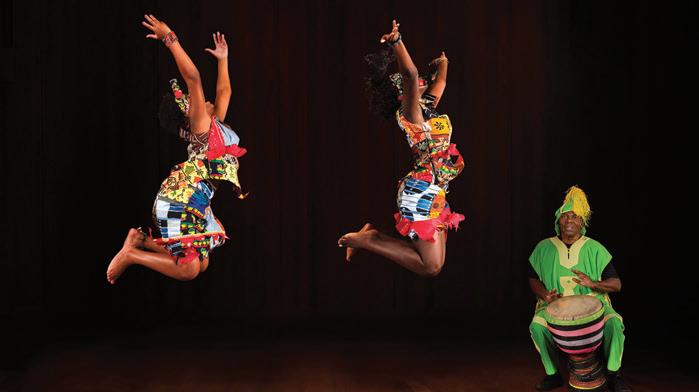
Spearheaded by dance pioneer Najwa I on Chicago’s west side in 1977 and officially incorporated in 1979, NAJWA Dance Corps has carved out a path for Black creatives and has inspired audiences with its dynamic performances featuring a mix of music and dance styles that celebrate African-American dance heritage and experience.
Executive director Sheila Walker Wilkins has been a part of the company since the start as one of its founding members and original dancers. Reflecting on the company’s early days, she says, “It wasn’t just a hobby to us. It was a lifestyle.”
Central to Najwa I’s mission was the preservation of African American history and culture through performance. To accomplish that, the company’s dancers and musicians mastered a variety of styles that shed light on different eras and places throughout the African diaspora, such as African dance, swing, jazz, and tap.
“In addition to African, we would also learn Caribbean dance. We were learning [African American] dance styles from the 1940s and 1920s,” Wilkins says. “The hope was to become a live archive of dance.”
Today, NAJWA Dance Corps’ leaders are determined to carry out Nawja I’s vision in fresh, exciting ways, incorporating modern influences such as hip-hop into their performances.
In addition, NAJWA’s artistic director Andrea “Najwii’’ Vinson has developed her own technique called “Afro Fusion,” which mixes different styles of jazz, hip-hop, and African dance.
“As [the company has] grown older, we’ve tried to add new choreography to our repertoire that represents dance styles that are going on now,” she says. “I think that the wide breadth of material that we have is what’s kept us going because we really love it. We love what we do.”
NAJWA is also home to NAJWA Junior Corps. The audition-based group of young dancers up to age 18 is led by artistic director Brenda (Malika) Moore, who developed their dance styles and techniques.
“The junior corps is designed to advance its members to a high-quality performance level and it also teaches them to be able to turn on and turn off techniques [in different styles],” she says.
Members are also provided opportunities to learn teaching and production skills, as well as the chance to participate in special performances. Among their major highlights of 2023 was an invitation to perform at Chicago’s Daley Center during the flag-raising ceremony for the Juneteenth Holiday.
Wilkins adds that many former junior corps members have received scholarships to study dance in college and some have transitioned into the senior company as professional dancers.
More than four decades into its existence, NAJWA’s impact on the dance community is only growing stronger. In 2018, they were invited to perform at the International Folk Festival in Puerto Rico, which Wilkins says marked a turning point in the company’s history.
“It allowed us to really realize our mission on a global scale,” Wilkins says. “We were representing Africa globally because people were coming to this festival from everywhere.”
In 2019 NAJWA joined the Chicago Black Dance Legacy Dance Project (CBDLP), an initiative that provides a robust set of resources to a select group of Black dance companies in an effort to reduce inequities within the city’s dance landscape. Through their participation in CBDLP, NAJWA’s leaders have worked alongside industry peers from esteemed local companies, including Deeply Rooted Dance Theater and Joel Hall Dancers & Center to upli Black dance.

“It’s been wonderful,” Vinson says. “A lot of times we don’t even get a chance to see each [other’s work] because we’re all working at the same time. . .. This is making us more aware of each other.”
Through CBDLP, NAJWA has taken part in joint performances with other dance companies in their cohort, which has helped introduce their work to larger, more diverse local audiences. They’ve also received assistance in capacity building, which is vital as they look toward securing a permanent home base in the near future.
“[CBDLP has] been beneficial in terms of offering the level of visibility,” Wilkins says. “A major goal for me is sustainability and capacity building for the company because that ensures our legacy and the continuance of growth.”
NAJWA Dance Corps is preparing to finish out the 2023 summer season with a bang. On August 11-12, they’ll participate in Dance Africa Chicago, a nationally recognized festival that honors African and African American excellence through dance. And on September 7, they’ll join eight other CBDLP companies at the Ravinia Festival to showcase their original choreography.
As NAJWA’s leaders keep their eyes on the future, their original mission is never far from their minds. “From the rituals of traditional Africa to the glamorous chorus girls of the swing era, and the developing hip-hop styles of the 21st century, we aim to educate and entertain our audiences about the Black dance experience,” Wilkins says.
The Chicago Black Dance Legacy Project is a program of the Logan Center for the Arts at the University of Chicago. Their current cohort of local dance companies includes Chicago Multi-Cultural Dance Center & Hiplet Ballerinas, Deeply Rooted Dance Theater, the Era Footwork Collective, Forward Momentum Chicago, Joel Hall Dancers & Center, M.A.D.D. Rhythms, Move Me Soul, Muntu Dance Theatre of Chicago, NAJWA Dance Corps, and Praize Productions Inc. For more about CBDLP, visit chicagoblackdancelegacy.org, and chicagoreader.com/special/ logan-center-for-the-arts-at-the-university-of-chicago.
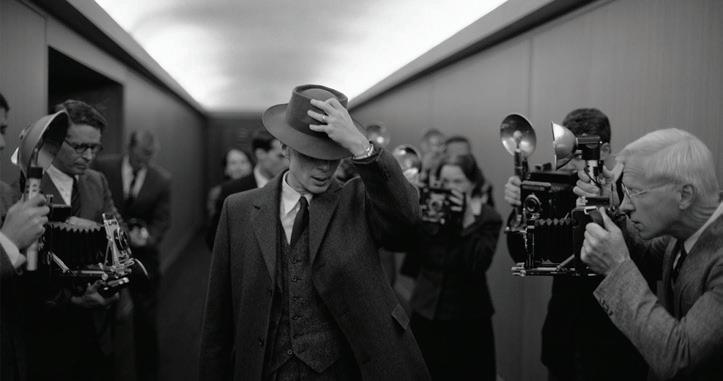
With the Doomsday Clock at 90 seconds to disaster, we’re at the movies.
 By DEANNA ISAACS
By DEANNA ISAACS
At my elementary school, a lifetime ago, duck and cover was as integral to our routine as recess. An alarm would signal the drill, and we first-through-sixth graders would drop whatever we were doing and scramble into a crouch under our wooden desks. The prescribed position was head down—one arm curled around your noggin, the other on top, for protection. We were to hold it until the all-clear, a few minutes later. It was the only time being a small kid was a distinct advantage. When it was over, we’d go back to Dick and Jane or long division without giving it another thought. It was a normal part of the only normality we knew.
Most of us haven’t given it much thought since. We know the threat of nuclear catastrophe is out there, but have managed to mostly ignore it and go on with our lives as if it isn’t—pushing that knowledge into a dark, silent corner (where, not coincidentally, those in charge of military secrets prefer it). Even in the face of new nuclear arsenal build-ups, blatant weapon brandishing, and a hot war in Europe, most of us were barely noticing. They were tiny red flags waving frantically, from a distance.
It took a big, noisy movie to get our privileged attention.
Last Sunday, exactly 78 years after the U.S. dropped its “Little Boy” atomic bomb on Hiroshima, the Bulletin of the Atomic Scientists cohosted a panel discussion after (another) packed-house showing of that film—screenwriter and director Christopher Nolan’s Oppenheimer—at the Music Box Theatre.
Like its atom-bomb subject matter, Oppenheimer (based on the major 2005 biography American Prometheus: The Triumph and Tragedy of J. Robert Oppenheimer by Kai Bird and Martin J. Sherwin) is larger than life, hard to
comprehend, and, except for its often inaudible dialogue, earsplitting. As several panelists and many others have noted, it also omits the stories of those on the receiving end of the bombs. “This film humanizes Oppenheimer,” DePaul professor Yuki Miyamoto observed.
“When will the victims be humanized?”
Still, Bulletin of the Atomic Scientists president Rachel Bronson said, this movie reminds us of the immense destructive power of these weapons. With every major nuclear nation investing in their arsenal, and with weapons now much more powerful than the one Oppenheimer was developing, “We’re on the cusp of
arms race 2.0.”
“We’re in a very precarious moment,” Bronson said.
A little background here: the Bulletin of the Atomic Scientists was founded as a newsletter in 1945 by Manhattan Project scientists who’d been working at the University of Chicago (the same concerned scientists you can see trying to reach the president to stop him from dropping the bomb on Japan in Oppenheimer and, more fully, in the clunkier, more objectionable, but easier to follow 1989 Manhattan Project movie, Fat Man and Little Boy).
The newsletter’s original title was Bulle-
tin of the Atomic Scientists of Chicago . Its purpose was to inform the public on nuclear dangers, while providing scientists with a forum where they could discuss public policy.
The late Martyl Langsdorf—artist, Schaumburg resident, and wife of Manhattan Project physicist Alexander Langsdorf—created the now-famous Doomsday Clock for its first issue as a full-fledged magazine in 1947. The clock is reset annually; this year, in part because of the war in Ukraine, it moved to 90 seconds to midnight, the closest it’s ever been to indicating imminent global catastrophe.
Astrophysicist and University of Chicago professor emeritus Don Lamb, who spoke with me just before Oppenheimer opened, said what really impressed him about this history was that the “physicists stood up and talked about things that are really important without being asked, and in spite of attempts to stop them. They took responsibility.” The Bulletin was integral to this, Lamb said, and the key was “when ordinary people paid attention to what scientists were saying, and became deeply concerned. In the 1970s and early ’80s, there were huge marches against nuclear weapons . . . putting pressure on the government to rein in this nuclear arms race.” A reduction in the number of nuclear weapons followed.
At a Bulletin webinar earlier this month, Hiroshima survivor Setsuko Thurlow shared what she saw after she was pulled from a crushed building a mile from ground zero: a bright sky turned dark, the ground littered with dead bodies, shu ing victims burned and swollen: “Nobody shouting or running; everybody just begging for water . . . my dear city, disappearing in one moment.” A founder of ICAN, the Nobel Peace Prize–winning International Campaign to Abolish Nuclear Weapons, Thurlow did not just go on with her life, as if it couldn’t happen again.
And at the Bulletin ’s website, in an essay that’s a companion to their excellent Oppenheimer special issue, physicist Lisbeth Gronlund argues that no one is in control: “Policy makers—not just in the United States but in all nations with nuclear weapons—have abdicated their responsibilities to curb and eliminate the threat posed by their nuclear weapons. They have let the interests of their military and arms producers control the agenda.”
Like the Reader, the Bulletin is a nonprofit. You don’t need a subscription to read most of the content on their website, but you need one to support it: $59.99 a year, at thebulletin.org. v

If you walk through Lincoln Park during clement weather, you may see Horace Nowell, 26, armed to the teeth with a baggy white suit and a respirator mask. Someone once mistook him for a beekeeper, so a bit of an inside joke persists among his neighbors: “Here comes the beekeeper,” they often cha . Horace upcycles old newspaper boxes, reincarnating them into interior design fixtures that can be used as record player stands, bar carts, display shelves, plant stands—you name it. He does the bulk of his work in the park— sanding, grinding o rust, priming, and painting. His painter’s suit shields his clothes from overspray, and the mask protects his lungs from chemicals and fumes. A good neighbor, he lays down a white tarp to leave as little trace as possible.
Horace is an avid reader of local news, especially print media. He gets the Chicago SunTimes delivered daily and regularly picks up copies of the Reader and South Side Weekly. So when he started to notice the disappearance of newspaper boxes, he got the idea to buy one for himself. He remembers seeing them on almost every corner when he was younger, each one advertising its news agency with distinct bright colors.
“They were really a part of that natural, urban Chicago scenery,” says Horace. “I noticed that they were kind of disappearing, and as a big Chicago history fan, I was like, ‘How can I have a piece of this Chicago history?’”
In the summer of 2019, he purchased a Chicago Tribune box from the 90s on Craigslist. Its paint had chipped, and it was covered in
rush and dust—a true vintage relic. He cleaned it up, slapped on a coat of fresh white paint, and preserved the original logo in its recognizable gothic font.
A few months later, he refurbished a decommissioned box from Hoy—a Tribune Publishing-owned, Spanish-language newspaper shuttered in 2019—this time taking things a bit further by adding interior lighting. Windy City Racks was born. In 2020, Horace established a small business that creates customized newspaper boxes that function as interior art pieces.
While the first Tribune box maintained its original intended use, holding his dad’s old papers from when the Bulls won various championships in the 90s, the second box served as a flashy record player stand.
Since then he’s restored a couple dozen newsstands representing various publications, such as the Reader , Red Eye , and Sun-Times. One client requested a box paying homage to the Chicago Defender, a Black-interest newspaper started in 1905, so Horace combed through Internet archives for hours studying photos so that he could mock up a worthy design.
Even before these DIY projects, Horace was no stranger to spray paint. As a high schooler, he painted murals throughout Chicago and even in other cities, like Berlin, perfecting his technique. Even so, because Horace aims to produce as close to a factory finish as possible, the painting process requires an extreme level of detail and e ort. There’s a lot that goes into these projects, but the hardest part is before
he even gets started.
Carless, Horace bikes all the way to suburbs like Cicero, Evanston, and Oak Park to buy spray paint. That’s because in the early 90s, the second Mayor Daley banned its sale in Chicago to crack down on gra ti, and the law is still on the books. A Streets and Sanitation webpage vilifies graffiti as “vandalism” that “scars the community, hurts property values and diminishes our quality of life.” Thanks to broken-windows-theory ideas about crime, graffiti has a bad reputation as a harbinger of violence and disorder. Consequently, the city spends millions scrubbing it from walls and viaducts. But when he was a kid, Horace’s biggest hobby was documenting, and thereby preserving, gra ti art.
Starting when he was eight or nine years old, he begged his dad to drive him from their home in Lincoln Park to some of Chicago’s industrial corridors to snap photos of freight trains as well as the gra ti art on the box cars. Back then, he didn’t have much of an interest in newspaper boxes themselves but instead was drawn to the collage of gra ti and stickers that accumulated on their glossy shells.
“I view most gra ti art as an art form; it’s something that I really appreciate. But unlike a lot of other art forms, there’s a sort of impermanence—because it’s not guaranteed to be preserved forever.”
Horace used photography to conserve these unique markings—that he considers pieces of Chicago history—bound to be lost over time, whether by human removal or succumbing to the elements.
WINDY CITY RACKS instagram.com/windy_city_racksThe focal point of his newest hobby, newspaper boxes, has proven to possess a similar impermanence, signifying the waning popularity of print media. But thanks to Horace’s artistic talent and passion for preserving Chicago history, some of those boxes will avoid the scrapyard in favor of someone’s living room.
As you’d expect from a history lover, for Horace, the more nostalgic way of getting the news possesses a certain charm. Even as print readership declines, he remains a loyal supporter, buying merch and subscriptions and reading as much as he can.
“It’s something about the tangibleness of a physical newspaper that really resonates with me. . . . It’s something that is printed and then shows up on your doorstep overnight . . . something that has a little bit of magic to it.”
He supports in other ways too. In 2021, Windy City Racks helped with a giveaway where people could win an upcycled Reader box by becoming donating members of the publication. Then last fall, Horace collaborated with the Reader for its 50th-anniversary celebration at the Museum of Contemporary Art by creating upcycled boxes for a moneyraising ra e giveaway.

When he’s not working on boxes, Horace makes time for other interests, all rooted in a deep love for Chicago history and its urban landscape. He’s an avid model railroader, a hobby that harkens back to photographing freight cars as a kid. He regularly DJs house music (a genre invented in Chicago) live on the air for 88.7 FM WLUW. His sets usually have a transit theme. And he enjoys going on bike rides with friends, or just riding solo, to explore di erent parts of the city.
While Windy City Racks has certainly grown since Horace’s first two projects, he wants it to remain a hobby, in part to have time for his other pursuits.
“I really kind of hope just to continue my work as it’s being done now. Because it is just a hobby. It’s something that I’m able to allocate a certain amount of time for without it being overwhelming. It’s something that I can really put a lot of passion and detail into and still be fun,” says Horace. “And that’s how I’d like to keep it for now.” v
In Daniel Kraus’s latest novel, a whale swallows a teenage boy whole.
By JANET POTTERDaniel Kraus’s Whalefall, which comes out on August 8, is a scientifically accurate thriller about a teenage boy swallowed by a whale—an idea that originated on the shores of Lake Michigan in Chicago. In November 2020, Kraus and two friends met for a socially distanced hangout at the Jarvis Avenue beach, where they discussed a viral video of two kayakers who were nearly engulfed in the mouth of a humpback whale in San Luis Obispo Bay, California.
As Kraus points out, it’s inaccurate to say that the kayakers in the video were almost swallowed by a whale. Although it makes for a less interesting headline, they were at most mouthed by a whale. But the idea of a person actually being swallowed by a whale “really got my mind working,” Kraus told me, “and I instantly wondered if anyone had ever taken it scientifically seriously.”
The next morning, Kraus emailed friend and fellow author Mary Roach, whose specialty is books on niche, often macabre science. She introduced Kraus to an expert on whale behavior, Phillip Clapham, whom she had consulted for her book, Gulp: Adventures on the Alimentary Canal
When Kraus asked him if it was possible for a person to be fully swallowed by a whale, “he said it has probably never happened, but it’s theoretically possible, if it’s a sperm whale.” The diameter of most whale throats is about the size of a soup can. A full-grown male sperm whale, however—weighing in at 60 tons and as long as five cars—could hypothetically swallow a person whole.
“I knew I wanted to write it as soon as I heard that it was possible,” Kraus says. “I’ve never had a book come together as quickly as this one did.”
Although he is originally from Iowa, had never been diving, and knew “nothing about whales,” Kraus is no stranger to epic projects. He is the author of over a dozen books, including The Living Dead , a zombie novel started by legendary filmmaker George Romero, and finished by Kraus after the director’s death. He also coauthored the book The Shape of Water with Guillermo del Toro, published the year after the Oscar-winning movie of the same name.

Clapham looped in an expert on the whale esophagus and an expert on whale stomachs, and the group began a long correspondence, gaming out how exactly a person could be swallowed by a whale, how and if they would stay alive inside its stomach, and how and if they could get out.
“There’s no air in a whale’s stomach, so it would have to be a diver who had his own air supply,” Kraus explains, and that diver would only have about 90 minutes worth of air.
In Whalefall , the diver is Jay Gardiner, a 17-year-old living in Monterey, California. He has grown up diving, because his father, Mitt, is an avid diver and local legend. But the things that make Mitt a legend—his all-consuming passion for the sea, his contempt for those who seek to commodify it, and his unwillingness to compromise either of those things—don’t make him an ideal husband or father. He has worked tirelessly to mold his only son, Jay, in his own image. He drills him on marine facts and diving safety, and takes him on whale-watching trips and diving expeditions that Jay would rather forego to stay home with his mother and two sisters.

After one disastrous boat trip, during which Mitt loses another job and directs his rage at his son, Jay leaves home. He stays with school friends, keeping in touch with his mother and sisters over the phone or on neutral territory, but never speaks to his father again. Not even when Mitt is diagnosed with cancer, halts treatment, and eventually dies.
At the end, when Mitt knew he wouldn’t survive his illness, he weighed himself down and threw himself over the edge of a boat. In the year since his death, Jay has endured
disappointment and outright disdain from his family and the local diving community, who loved his father and don’t understand why Jay stayed away, even when he knew his father wanted to say goodbye.
To counter that disdain, and perhaps to put his own guilt to rest, Jay decides to return to the site of his father’s death and dive to search for his remains. What he finds instead is the inside of a whale.
Jay is inside the whale for the majority of the book. Chapter headings tell the reader how much air is left in his tank, acting as a countdown to the moment Jay either needs to find a way out of the whale, or su ocate inside it.
“I was really intent on doing it with total accuracy,” Kraus says. “That was the whole fun of it.” Despite a sperm whale’s gargantuan size, its stomach is roughly equivalent to an “elastic sleeping bag,” and Jay is left with nothing but the things he carried in with him and the detritus in the whale’s stomach (plastic bags, squid remains) as tools.
These chapters are interspersed with flashbacks to Jay’s life, chiefly his tumultuous relationship with Mitt and the time they spent together in and on the ocean. When he finds himself alone in the belly of a sperm whale, the voice that comes to him is his father’s.
The result is a deft pairing of a ticking-clock thriller and an incisive portrait of a father-son relationship, like The Martian, except here the main character has an inner life.
“I thought the premise was so powerful that I wanted something equally simple and powerful for the central relationship,” Kraus says. Jay’s chance of escaping the whale relies on him remembering the things Mitt taught him—about his equipment, about whales, and about the ocean. What started as a mission to put his father to rest becomes a chance for Jay to understand his father in a way he never did when he was alive. Mitt’s unflagging efforts to shape an unwilling Jay into someone who could take up his mantle might end up being what saves Jay’s life. As Jay himself realizes, in the belly of a whale: “Heaven and hell are the same: the ones you love.” v
Whalefall is both a ticking-clock thriller and an incisive portrait of a father-son relationship.AUTHOR PHOTO BY SUZANNE PLUNKETT
The festival’s Fall Living Room Tour runs 11/9–11/ 11; next year’s festival runs 1/ 17/24 –1/28/24. For information on performances and classes, see chicagopuppetfest.org.
“Did they have puppets 10,000 years ago?” I asked in response to a story Blair Thomas, founder and artistic director of the Chicago International Puppet Theater Festival, was telling us about humanity’s long-term relationship with puppets. Thomas replied without missing a beat.
“Yes! Do you know how we know?”
“How?”
“Past life regression!”
Seven artists from different ages, stages, and walks of life had gathered for a week for his puppet intensive called The Double: Puppet Performance Workshop. There were smiles around the room to Thomas’s reply, but this was day four of a six-day program and none of us were surprised by his answer. He’d been hitting us with some Jungian truth bombs for a while, sprinkled in amongst technical puppeteering tips and soul-searching challenges.
That morning, for example, he’d shepherded us through a yoga and meditation practice followed by some reflective puppet journaling—
all designed to get us thinking more deeply about our shadow selves as reflected in the vacant, nonexistent eyes of our puppets. And this was all before lunch, when the real puppet explorations typically began. Not only that, but he called us puppeteers each morning. The only equivalent in identity euphoria I’ve experienced beyond that is when someone gets my pronouns right.
I had faced some internalized puppetphobia before the workshop. I feared that friends would smile indulgently as they pictured me crouched down behind a children’s puppet theater talking to myself. No one actually reacted that way, but my imaginary judges were half-correct. I was required to talk to myself, and it was one of the most freeing aspects of the whole adventure.
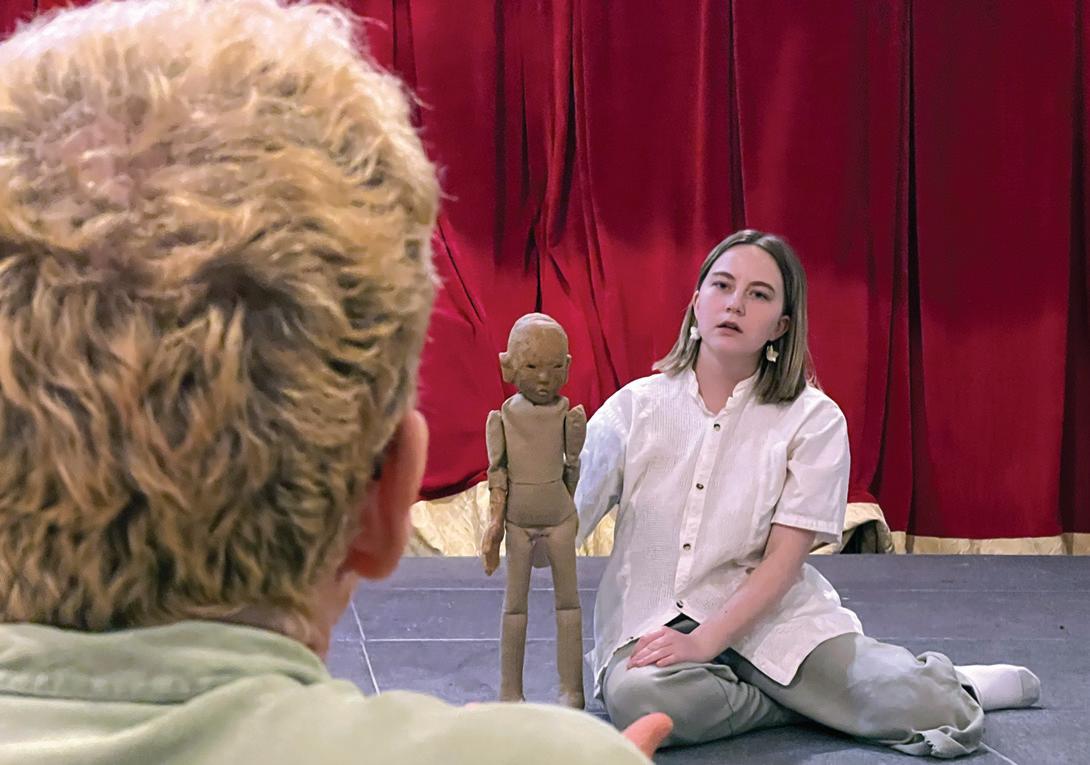
Classmate Alice Wedo (actor, songwriter, performer, and elementary school drama teacher) understands intuitively how much freedom of expression puppets give her. She uses them frequently in her classroom to
introduce new concepts to the students, but having an intensive week for her own acting practice reawakened her love of performing.
“It would be di cult to ball up an actor and shove them into a backpack, or hang them upside down and cut off their fingers with scissors, or decapitate them. However, you can do this relatively easily with puppets. Puppets are the original virtual reality, but unlike the VR we see today, they require more imagination from the audience.”
On any given day of the workshop, located in the historic Fine Arts Building, any of us could be found hovering over puppets mumbling lines and trying out some of the frightening antics Wedo mentioned. It was awkward at first, but if you want to explore your shadow side, mumbling and antics are a good way to gain access.
Our classmate, Joan Nahid (an Iranian fiction writer, actor, and voice artist based in Chicago), explained what that access point meant to her. “The puppet show has opened
new doors for me. I can make the fictional characters that I have created appear in the form of dolls, and I can perform with them myself . . . And because they are dolls, they have no limits to show the darkest aspects of humanity. They are uncensorable, and this is one of the most important aspects of art.”
That elusive quality that Wedo and Nahid described was a recurring realization for many of us. Thomas touched on it a few times, pointing out the otherworldly presence of puppets and explaining how “We can’t cross over into its world, so it comes to ours.” He encouraged us to experiment with ventriloquism and find our puppet’s voice, whether it be through movement or spoken word.
The chimeric quality of puppets emerged as a dissonance between my romantic image of what could occur between object and person and the cold, tricky business of making that happen by arranging the lifelike movement of said object. Thomas called it “co-presence,” and I was delighted to witness it in everyone’s puppetry, yet despondent to not quite feel it in my own interactions with my puppet as anything but a slight glimmer.
LA- and Chicago-based actor Courtney Knight described the challenge quite well. “I was unprepared but excited to learn how puppetry requires at least twice the care and awareness! You have to be conscious not only of your own body but of an entity completely outside of yourself. And what’s more, while a puppet is seemingly completely dependent on its puppeteer, I don’t know if I appreciated before how the relationship actually is far more symbiotic than it appears on the surface. Because what’s a puppeteer without their puppet?”
That connection is where the nuts and bolts of making and operating these creatures came into play. We sprawled on the workshop floor, taping together paper to create full-sized puppet alter egos, to make life masks, and play with movement techniques under Thomas’s tutelage.
The challenges and prompts were many: Have your puppet complain. Have her use a











prop. He knows you’re there when you are using your prop but not when he’s using his. Undermine your puppet. Have your puppet undermine you. Slow down, break moments into pieces, use specific motions, focus on actions. Be present in space.
Some of it felt as familiar as our morning yoga workout.
Then it got more complicated: Make the impact land. Project meaning onto the puppet. Foster a co-presence between you. Direct the eye. Don’t rush. Expand. Hold the stage. Heady stu . Could it be puppet wisdom for everyday life? Perhaps, but what emerged from these experiments of dancing with our doubles was far from the sweetness you might imagine if you picture soft, felted beings sitting upon our laps, obediently awaiting the breath of life. Instead it was as if they possessed us, drawing out the meaty human bits with every subsequent experiment: puppet interrogations, puppet suicide, puppet/ human boundary exploration, a taunting puppet ghost, puppet intergenerational trauma, puppet ephiphanies, puppet rebellion! The good stu . All that was left to do was to get the mechanics right and put it all together with the support and guidance of one another. The tricky part.
The Chicago International Puppet Theater Festival is building a wider network of puppet community in Chicago, and this workshop, one of a series of three (the other two workshops were Physical Shadow Puppets on the Digital Stage Intensive with Tom Lee and Linda Wingerter, and The Performer, the Object, and the Secret in Between Intensive with Yael Rasooly), is just a small part of fostering that. The Chicago Puppet Studio for example, which makes puppets for local productions, is housed on the premises. It was delightful to be around skilled puppet makers who were working each day to create puppets for various productions of theater, opera, television, and film.
Beyond the festival and the studio, there is the Chicago Puppet Lab, an eight-month-long incubator and residency program for new works in puppet theater. The program seeks to expand equity and innovation in the puppetry world by inviting in artists from various disciplines and backgrounds and providing support in a laboratory setting. Over the years, as a result of these programs, the presence of puppet-based and puppet-adjacent works have visibly increased, as has the interdisciplinary mingling of puppeteering with the wider performance community.

From the start, our ragtag bunch of artists felt the support of this community. I struggled with feeling as if I belonged there at first. A lifelong curiosity about puppetry had led me to this place. In recent years, I had attended the Puppet Fest and marveled at the beauty and ingenuity of contemporary puppet arts. But indulging my secret desire to be a puppeteer was something di erent. It was a performance workshop, and I had the least amount of performing experience. Would my imposter self be outed? It was a workshop designed to explore the double nature of our existence. Was I going to have to delve deep and discover even more trauma than the universe had provided to us all in recent years?
Turns out, no angst was necessary, because,
as my puppeteering pal Knight explained, “The environment created by Blair and the rest of the class was so generous . . . I truly felt it led to incredible, vulnerable work by every participant. Going forward in my career, I hope to help foster that same kind of environment with all my future collaborators. It was a nice reminder of the responsibility we have towards each other as artists.”
Magical elements had to align to make it a growth experience: a seasoned teacher, full of knowledge and curiosity, Thomas was willing to meet everyone exactly where they were at and to provide the tactful yet honest feedback needed for growth. Add workshop attendees who were, as noted, all talented performers who provided an a rming environment. We
were not exactly collaborating, since each of our journeys was personal, but we were on that train together and able to support each other if things went o the rails.
The last day was the most intense, with a small “works in progress” showing to friends and family. I was barely nervous at all. I suppose the title of the workshop itself should have tipped me o . You can’t embed yourself in an artistic environment with a tight social group, a short period of time, increasingly technical and physical demands, and still expect to walk away unscathed. For me, the change happened midweek. The benefits of facing my double and learning something challenging had already been seeping into my regular life. Besides taking fierce, face-down naps as soon as I got home, I found my mind’s chattering anxieties had quelled in favor of being present.
Suddenly, I could focus on my curiosity and tune in to some lost creative part of me. (Was that my doppelgänger?) After that, I was just left to grapple with that imperfect process of physical learning when your mind is a lightyear ahead of your body, and when your brain suddenly taps out midday, leaving only a bundle of inelegant muscle memory to finish the job.
Play, creativity, challenges, emotional exploration, physical embodiment. Those are some of the elements that make learning and growth possible. Is it a coincidence that they are the same exact things that make puppetry come alive? Perhaps Thomas was onto something.

Classmate Honglan Huang (a filmmaker, researcher, and artist) described how the whole process helped her as a creator. “I wanted to take this class because I wanted to think about duality and double consciousness in a more embodied way. The thing I appreciated the most from the class was being able to see other people’s creative process, and the class really helped me model the kind of creative process I would like to have for myself when making new work.”
We all got attached to our puppets, bonding with them over a week of storytelling with our other halves. Saying goodbye was as simple as putting the puppet down and walking away, lighter somehow for having held space for our alter egos and for the chance to learn something of the craft from each other.
Or as Thomas reminded us, “We arrive together although there is no destination.” v

























The Reader is grateful to Saba Ayman-Nolley for her work on this story as a Persian-toEnglish translator. A retired psychologist born in Iran, she has helped many Afghan refugees as a volunteer with the Hyde Park Refugee Project.
Fazel Ahad Ahadi expected to spend his whole life in Afghanistan with his extended family. At 40, the mild-mannered founder of the cinema department at the University of Kabul had recently finished building his own home, with his own hands, near the campus. His wife, Nasrin, was decorating. Baby Sana, the youngest of five children, was learning to walk.
But in summer 2021, Ahadi found himself hastily dismissing class and speeding home to raise a bonfire of books in his backyard. The Taliban had reclaimed Afghanistan’s capital city, and a 20-year artistic renaissance had come to an abrupt and violent end. Cinema houses across the country were being demolished, Ahadi’s department would soon be disbanded, and his 150 students—almost all young women—would be expelled. Only in exile could Ahadi be safe and continue his work. It was time to go.
Ahadi is a poet, playwright, screenwriter, prolific writer, and born mentor who has trained a generation of Afghan screenwriters. He has published in Persian (of which Farsi and Dari are both dialects) several collections of poetry and numerous

books and articles, most concerning cinema. As of yet, none of this work has been translated into English. But he is less interested in talking about his own career than about the plight of his countrymen. Nothing can better convey this to the world, in his opinion, than film.
“The Afghan film scene was not yet well developed” in 2021, he says, “and now it is broken. My message to American filmmakers and film scholars is not to forget us.”
In the Chicago apartment cozily furnished for him by dedicated volunteers from the Hyde Park Refugee Project, Ahadi deflected questions about his life and career until he had related the entire saga of his family’s exit from Afghanistan. From time to time he emphasized, “This is a real story that I am telling you.” Someday, he says, he may write a screenplay or a novel about his family’s evacuation.
The tale begins in August of 2021 when Kabul fell to the Taliban. A notoriously oppressive militia of Muslim extremists, the Taliban had been deposed by the U.S. in the wake of 9/11. But keeping them at bay continued to require American military assistance, and that was coming to an end. By the time the last U.S. troops departed, the Taliban were already back. In Kabul, they immediately began shutting down cultural and educational establishments and dismissing women and girls from their schools and jobs.
Ahadi says he too might have disappeared, had he not been helped out of Afghanistan. For about a year before the U.S. withdrawal, he had been receiving threats from the Taliban.
As a screenwriter, poet, and academic, University of Chicago visiting scholar Fazel Ahad Ahadi has played a pivotal role in the world of Afghan cinema—but the story he wants to tell is of his family’s harrowing escape from the Taliban.
He got anonymous phone calls. He got messages on Facebook, where his poetry had been used in anti-Taliban campaigns. He had also attracted attention by writing a sort of battle hymn for the pro-Western government.
“Are you the author?” the caller might say. “If we win, you know what we will do with you.”

The Taliban’s strict interpretation of the Quran means that almost every form of art is prohibited as sinful. Dance and theater are seen as affronts to the Almighty. So is any painting, photograph, drawing, or video of a living creature. At music schools, fleeing scholars hid their instruments lest they be deliberately destroyed.
On August 15, 2021, the sun rose on a day like any other day. Ahadi, teaching his usual Sunday morning class in a quiet corner of the Kabul University campus, was immersed in a discussion with 16 female students about the movie Opium War. Through a window, he saw over his students’ heads that, some distance away, people were running from the campus. He and his class were the last to learn that Taliban forces were entering the city. Ahadi rushed to his o ce to retrieve a few essentials. He took a short moment to say a final goodbye to the o ce where he’d worked happily for 17 years. Then he ran to his car, which stood solitary in the parking lot.
His wife reached him by phone while he was driving. Nasrin Ahadi had heard of the Taliban’s approach hours earlier on television, and she wondered anxiously why her husband was not yet home.
Fazel Ahadi was hyperventilating as he answered her. Fearful of being stopped and searched, he had abandoned his usual route home. In his car trunk, along with a few books and papers, were his laptop and external hard drive—virtually his life’s work, most of which was explicitly critical of the Taliban. He turned o the highway after passing a “Taliban car.”
When asked how Fazel recognized the “Taliban car,” the Ahadis burst out laughing. In fact, it was an open U.S. military Jeep flying a white Taliban flag and piloted by a man in a turban, robes, and an unruly beard.
Ahadi arrived home to find everyone frightened and crying, but there was no time to recover. Their first order of business was to destroy a large trove of Ahadi’s own writings. He had laid plans earlier with his colleagues at the university: literature critical of the Taliban must not be left behind. He had 200 copies of a 2008 book in which he had cataloged the tortures and deaths, at Taliban hands, of more
than 700 Afghans.
They carried all the books to the basement so that no one could see them through the windows of the house. They began to tear them up, but it was taking much too long.
Moving outdoors, they were grateful for the high walls that surrounded their yard; neighbors could see the smoke rising from the bonfire the family built, but they couldn’t tell what was being burned.
As the flames rose higher, the Ahadis worried that their house would catch fire. Some neighbors expressed concern for their safety, but they were sent away. No one could be trusted.
The sun was setting. Burning the books was still not fast enough. Frenzied, they dug a big hole to serve as a tomb for the forbidden writings. They capped it with cement from the mixer they’d acquired while constructing their home. Day ended and job finished, they returned inside and wondered what to do next.
Chief among Ahadi’s rescuers was the renowned Iranian filmmaker Mohsen Makhmalbaf. Having expatriated from Iran to France in 2005, the senior artist was busy pulling international strings while the U.S. gradually withdrew its troops. Working with him from France were two expat Afghan filmmakers, Atiq Rahimi and Siddiq Barmak.
That first night, Ahadi got a phone call from Makhmalbaf. Ahadi had never spoken with him before, but he knew that the elder artist had been trying to find jobs abroad, through the Scholars At Risk program, for members of the Kabul film department. Scholars at Risk is a loose international network of academics that originated at the University of Chicago in 1999. They are dedicated to helping colleagues in danger from war, natural disasters, or government oppression. Ahadi and three of his colleagues had been chosen for evacuation and job placement from a short list presented by Makhmalbaf. The Iranian told them that he was making arrangements for the Ahadis’ evacuation, perhaps to France.
Ahadi sent Makhmalbaf images of all his family’s passports and waited for instructions.
The next day was spent in the house with the lights out. When they began to hear shooting, they moved to the basement.

The day’s single bright note was another call from Makhmalbaf. He was sending a car the next morning to take the family to the Kabul airport, where they should be ready for a long wait.
“If you’re a smoker,” he advised, “bring

plenty of cigarettes.”
At 4 AM on day three, the car arrived at their door. Ahadi wished he could call his mother, but it was better that she knew nothing.
The Kabul airport was the only way out of Afghanistan, and the roads leading there were choked with people, many on foot. It was impossible for the Ahadis’ car to reach the terminal. They returned to their house and waited for an opportunity to try again.
On August 25, some 11 days in, they made another attempt. A driver left the family near one of the airport gates, called Abbey Gate, where crowds of people were waiting for an opportunity to board a plane. After 12 hours, Makhmalbaf phoned to say that, once again, there was no hope of getting inside the airport.
(The next day, Abbey Gate would be decimated in a suicide bombing that killed almost 200, most of them Afghan civilians. Terrorists from the Islamic State claimed responsibility.)
Advised by Makhmalbaf to leave Abbey Gate, the Ahadis were afraid to go home again lest neighbors, observing their movements, should inform on them. So Nasrin Ahadi’s brother drove them to the home of her parents, who hid the family for three weeks.
Scholars at Risk then instructed Ahadi to move his family to the Afghan city of Mazari-Sharif, where some 3,000 people were waiting to be evacuated by the United States.
After bidding goodbye to Ahadi’s in-laws, the family took the SIM cards out of their phones. Communication with friends and family would remain suspended until they were out of Afghanistan.
To make the trip to Mazar-i-Sharif, they would need their passports, which had expired during their weeks in hiding. Renewing them was not easy, as most government o ces were closed. Fortunately, Ahadi had a friend who
was employed by the passport o ce and knew who had to be paid o .
“Money opened doors,” Ahadi reflects.
Soon there were seven passports in hand—a mixed blessing, for while they couldn’t travel without them, they were fearful when they had to show them. The bus to Mazar-i-Sharif was stopped at military checkpoints about 50 times along the way. Taliban soldiers would board the bus to inspect and interrogate passengers, pulling some of them o the bus. They were especially interested in natives of Panjshir, a district renowned for resistance to the Taliban. Ahadi and his wife had both been raised there, and the name of Panjshir was prominently displayed on their passports.
At one checkpoint, two soldiers jumped aboard and demanded, “Who here is from Panjshir?” Ahadi had to restrain his five-yearold son, Abdullah, who was proud of being a Panjshiri and eager to shout an affirmative response.
But then the soldiers began to walk through the bus and inspect passports, row by row. They were just two rows away when a woman jumped up and began to protest and argue with the soldiers. The Ahadis had no acquaintance with the woman, but they couldn’t have wished for a better ally: the soldiers never got around to the Ahadis’ passports.
The Ahadis hid for 40 days in Mazar-iSharif, among a dozen families who found refuge in unused parts of a shopping mall. Taliban troops came into the open shops routinely to buy things, sometimes just feet away from adults and children hiding on the other side of a wall.
The families kept in touch via WhatsApp. Ahadi and his wife say they were in fear every hour. Every airplane that flew overhead, every car that passed beneath their doors and windows, could be a harbinger of a military attack.
On one occasion, a WhatsApp message announced the arrival of Taliban troops, and through a gap in the curtains they could see five or six trucks carrying heavily armed fighters.
The soldiers roamed the premises for 30 or 40 minutes. At one point when they were just outside the room, baby Sana Ahadi was inclined to make noise. Her mother had to stifle her so thoroughly that the child turned blue under her hand.
Days and weeks passed while they hid behind the walls of the mall shops.
When an email arrived from Germany offering hope of asylum there, Ahadi was at first suspicious. He didn’t know the sender. But after writing to the German embassy in Pakistan, he was reassured. Academics at the Goethe-Institut had arranged with their government to take his family in. If they could just get over the border into Pakistan, the embassy would welcome them and transport them to Europe. But overland travel was unsafe, so the seven of them would have to fly. Again they were helped by a friend, this time an airline employee who helped them get tickets.
They applied for seven visas at the price of 2000 Afghanis each (about $20). Five visas arrived, leaving documents lacking for two of the children. “We waited a long time,” Ahadi says, but the two visas did not arrive. Finally, they had to apply for two “urgent visas” at a price 50 times higher. Afghan companies, he explains, had capitalized on the high demand. Ahadi didn’t have the extra $2,000, but someone in the evacuation network must have intervened, because he got the visas.
For the Ahadis, stepping into the Kabul airport after six months on the run or in hiding was like returning from an alternate universe. The terminal was operating with the same sta as before the Taliban retook the country,
and the family was treated with kindness and courtesy. Ahadi had not spoken with his mother since leaving Kabul, and once onboard the airplane it was a huge relief to be able to call her.
With the SIM cards back in the phones, countless emails and text messages were finally read. The Taliban had been asking about Ahadi on the Kabul campus, and they had turned his house upside down. Everyone wanted to know if the Ahadis were OK.
And they were OK. The Germans lodged them for three weeks in a fine hotel in Islamabad. Then they were flown, in late March 2022, to a place near Cologne, in western Germany. There they were housed and provided with food, health insurance, and cash stipends. They got German lessons, and the children attended school. Everything was “shockingly clean and beautiful,” Ahadi remembers.
Young Milad, Ahadi’s third child, still misses the friends he played soccer with during their eight-month sojourn in Germany. But his father had no professional opportunities there. And so, last December, the family boarded the flight that brought them to their new life in Chicago.
In an email exchange, Makhmalbaf says he helped 365 Afghan artists to evacuate. Just four of these were able to secure academic posts in the West: Ahadi and three of his colleagues from the film department. Two of them were hired at Harvard University, and one is employed in France.

This spring, Ahadi gave his first lecture on the University of Chicago campus, bringing with him a 17-year teaching legacy and deep ambassadorial skills. With Iranian filmmaker Hossein Khandan serving as translator, Ahadi presented an overview of 75 years of Afghan cinema.

In response to a question about the common themes of Afghan films, Ahadi reflected on the state of the country and the lack of positive, hopeful source material. Afghan filmmakers make films that reflect what they know. Ahadi says, “We should make movies about the beauty of life, but instead we show violence against women and children.”
Those themes emerged strongly while Ahadi’s Kabul film department was still in its infancy. In 2003, Makhmalbaf’s daughter, Samira Makhmalbaf, released a luminous fulllength feature film about Afghanistan. Titled At Five in the Afternoon —paying homage to Federico García Lorca’s 1930s revolutionary poem—it tells its stories with a simple, disarming candor and with gorgeous cinematography. Viewers are confronted with the struggles of Afghan women who, even under the new pro-Western government, were still heavily oppressed by the Taliban’s terrorism and misogyny.

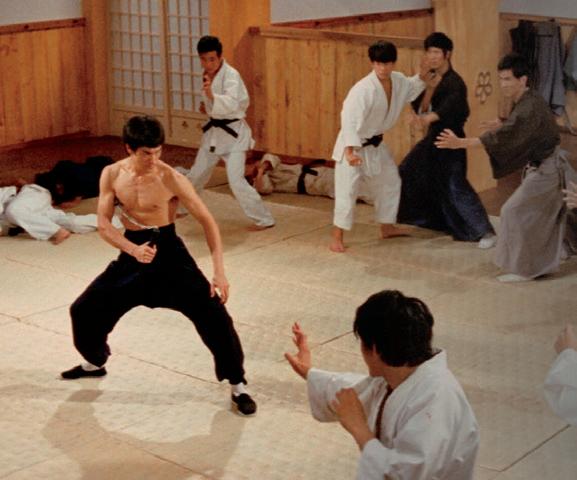
Ahadi concluded his presentation by screening a ten-minute film made by one of his students at the University of Kabul, Seraj Ahman Bayat.
In the film, Bicolor , a 12-year-old girl searches for the grave of her mother, who was murdered by her father, a Taliban terrorist who builds bombs in his kitchen. When a bomb explodes accidentally, the father begs for help, even offering to reveal the mother’s burial site, but the girl merely stares coldly as rubble buries him. As her father dies, she pulls out a
Fazel, his wife Nasrin, and their fi ve children at their Hyde Park home in August

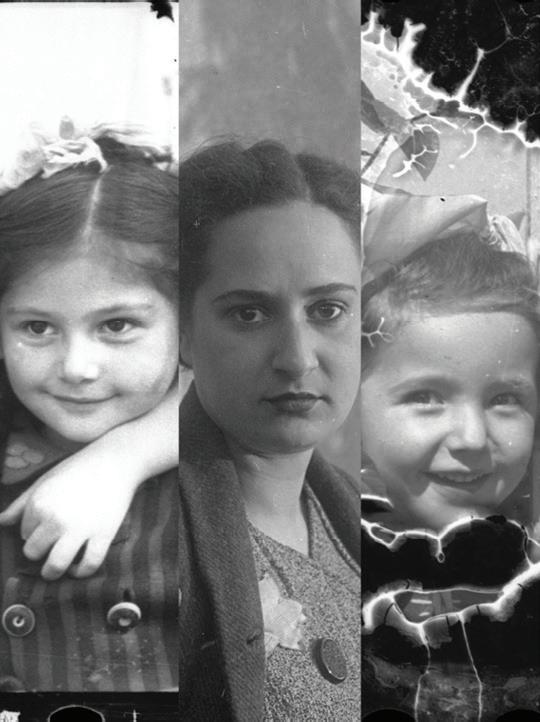 2023 MATTHEW GILSON FOR CHICAGO READER
2023 MATTHEW GILSON FOR CHICAGO READER

contraband bright-red lipstick and smears it onto her mouth in a crude crimson ring.


Among those attending the presentation were Ahadi’s oldest son and daughter. While the audience of American scholars reacted to Bicolor with horror, 14-year-old Anas and 12-year-old Bahara watched with serenity and pride.

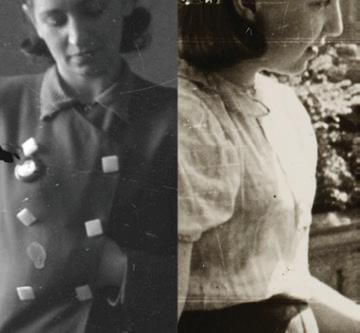
Now, for all seven Ahadis—especially the parents and the baby, who don’t attend Chicago public schools—studying English is paramount. They work diligently with their volunteer tutors. They’re settling into their new life, with more opportunity and abundant greenery; they love the name of a street near their Hyde Park home, Greenwood Avenue, which for them sums up the feel of the neighborhood.
Says Ahadi, “I am happy that, alongside my film activities, my children are studying and building a good future for themselves. Meanwhile in Afghanistan, children are deprived of everything, especially girls who are not even allowed to go to school.”
Ahadi is learning as fast as he can, and he’s made his intentions clear. He wants the English-speaking world to know what he’s been through. And he wants to serve as a cultural ambassador, while continuing to nurture Afghanistan’s community of exiled artists.
“Making movies,” he says, “is the best revenge we can have on the Taliban.” v





letters@chicagoreader.com
The latest from renowned documentarian Steve James, A Compassionate Spy provides an intriguing historical counterpart to this summer’s Oppenheimer yet suffers from some indulgences and limited perspective.
In 1944, 18-year-old recent Harvard graduate Theodore “Ted” Hall was recruited as the youngest physicist to work on the Manhattan Project. Concerned about the consequences for a world in which the United States— particularly one leaning into fascist tendencies—maintained a monopoly on nuclear weapons, Ted decides to spy for the Soviet Union, transferring detailed information about the Los Alamos National Lab and the science behind atomic weapons.
James utilizes a mix of archival footage, lengthy interviews with Ted and his wife, Joan, and reenactments, covering Ted’s spying as well as his romance from their early days at the University of Chicago and their later family life. The archival footage is impressive in its range and detail, providing a compelling look back at the simmering tensions of postwar America. Less can be said about the reenactments, which have a mediocre level of performance usually reserved for the worst of true-crime television and truly disrupt engagement with the otherwise weighty material of the film.
Narratively, A Compassionate Spy suffers from a dri into hagiography. The interviews that make up most of the narrative center offer an o en too-saccharine view of Ted’s decisions from the people who loved him most and have little doubt as to his moral righteousness. For his part, Ted, suffering from declining health because of Parkinson’s disease and renal cancer likely contracted from his work with radioactive materials, is at times more reflective, troubled that he may have helped perpetuate the USSR’s descent into Stalinist terror.
Ultimately, A Compassionate Spy is an intriguing
and unfortunately flawed story of one man dealing with the consequences of feeling compelled to act in uncertain circumstances with the highest of stakes. —ADAM MULLINS-KHATIB 101 min. Gene Siskel Film Center
Anthony Bawn’s H.I.M. follows Damien (Brandon Karson), a heartbroken college student, and his cousin, Kendall (Rahim Brazil), who finds a romance with a church boy, rocking his relationship with his mother.
The film opens with a harsh conversation between Kendall and his friend—two Black gay men in the closet— where Kendall challenges his sexuality and experience with women. But quickly, the viewer realizes, everything is a test in H.I.M., and what we think is unfolding leads to something more open and sensual.
Reader, don’t watch this film unless you’re ready to jump someone’s bones a erward. H.I.M. is, indeed, incredibly sexy. The tension between forbidden fruit, secret kisses behind closed doors, and salacious college flings will get anyone pulsating below the belt.

Although the film can be amateur—with actors tripping over their words and a shaky camera—it adds to the authenticity of everyone’s interactions. Moreover, the dark, deep topics explored in the film are exemplified through the actors breaking the fourth wall, smashing stereotypes surrounding masculine men, and combining humor alongside sexual desire. —S. NICOLE LANE 104 min. Wide release on VOD
“Are you really at peace? Are you really at peace with yourself?”
Amid the hustle and noise of their lives as transfemme sex workers in New York and Georgia, Kokomo City director D. Smith carves out an oasis for Daniella Carter, Koko Da Doll, Liyah Mitchell, and Dominique
Silver to reflect on this question. Whether they’re curled up in bed, applying lipstick in the mirror, or strolling down the streets of Queens, Smith captures these four women in their element in striking black-and-white; each shot feels like a tintype portrait—raw and unique.
Daniella meditates on the intersection of Blackness and transness, two storied identities that rarely coexist in complete harmony. Liyah recounts the ways clients can transform when they escape the suffocating surveillance of street culture. Koko hopes for a brighter future while reflecting candidly on her past. Dominique speaks on the ways desire and shame can make powerful men feel small.
“We are always existing around systems of who we should be for someone else,” says Daniella. Kokomo City invites us to reflect on where modern sex work fits into these systems for trans women of color: as a cog in our wider capitalistic patriarchal system or as an avenue to subvert the Black male archetype. The questions this documentary poses may have many right answers or none at all, but all are worth asking.
This is a film so chock-full of powerful, poignant, and thought-provoking moments that audiences without access to a pause button may find themselves coming back to the theater just to catch another quote they missed the first, second, or third time around. A triumphant and impactful directorial debut for Smith with the staying power of Paris Is Burning, Kokomo City asks us what it means to be at peace with ourselves and what we’re willing to sacrifice to get there. —BROOKS EISENBISE R, 73 min. Gene Siskel Film Center
The worst enemy of the ninja turtles, at least in Hollywood, has been their heads. First they were rubber and animatronic, then computer-generated with distractingly round snouts, and then tiny and on top of grotesquely muscular bodies. Mutant Mayhem finally gets it right: these turtles are animated in an electric style that resembles clay splashed with vibrant colors and rough sketch lines. It’s enough to power this loving, if somewhat tame, reboot.
The origin story includes a scene where single rat dad Splinter (a sincere Jackie Chan) takes his toddlers in half shells to Times Square. The turtles (voiced by teens) feel like teens. Michelangelo has braces, Donatello wears glasses, Leonardo crushes on April (Ayo Edebiri), and Raphael is still cool but rude. They scroll phones in bed. There’s a lot of fast-talking and pop-culture references, but few laughs. Maybe the PG-rating blunted the script, written by Superbad’s Seth Rogen and Evan Goldberg and others—though one turtle does get stabbed. The plot offers the usual superhero fare: a mutant fly (a delicious Ice Cube) hell-bent on killing humankind, a scientist who wants to birth animal-mutant super soldiers, and a super-duper mutant monster who terrorizes Manhattan.
Halfway through Mutant Mayhem, a gang of mutants injects some welcome 80s cartoon weirdness into the story, including an alligator (Rose Byrne) and a bat (Natasia Demetriou). Mondo Gecko (Paul Rudd) asks if instead of all the cowabunga, the characters can just kumbaya for a bit. That’s probably too radical for a kid’s movie, my lizard dude.
—SUJAY KUMAR PG, 99 min. Wide release in theaters
Nostalgia is a powerful thing. From Gossip Girl to Raven’s Home from iCarly to Girl Meets World, the past decade, for better or worse, has so far proven to be the era of the revival. It can sometimes feel a little unoriginal, as studio a er studio looks back into the vault to see what hasn’t been milked dry, and Zoey 102 is Paramount+’s latest trip down memory lane—released exclusively to streaming.
It’s been more than a decade since we last saw Zoey Brooks (Jamie Lynn Spears) and her friends at PCA, short for Pacific Coast Academy, a fictional southern California boarding school in Nickelodeon’s Emmynominated show from the mid-2000s. I was entering my teens when Zoey 101 ended and can remember how much my friends and I wished we went to PCA. The school was walking distance from the beach (filmed primarily at Pepperdine University in Malibu, California), and we were more likely to see them riding hot-pink electric scooters and eating sushi than we were to ever see them in class. So why does Zoey 102 spend so little time at the very place that made the show so iconic?
No spoilers, but instead, we follow Zoey as she reunites with her friends for the first time in years for rich kid Logan and brainiac-turned-inventor Quinn’s wedding. Once a popular student at PCA, Zoey is now going through the familiar young adult struggles: working a toxic job, wincing through first dates, and spending lonely nights scrolling on social media. When she finds out her high school sweetheart Chase (Sean Flynn) will be at the wedding, Zoey hires a fake boyfriend to impress all her friends in typical rom-com cliche. Further hijinks ensue when she realizes the wedding is the same weekend as a big project at work.
Zoey 102 is charming enough, and there are a lot of funny moments, but it frequently feels like something is missing. Ultimately, what made the show special was the unique environment the characters were in, a situation the average teen had never been exposed to. They didn’t have musical abilities like on Victorious, and they weren’t nearly as quirky as the kids on iCarly They were mostly normal kids in an abnormal setting, and until the movie takes us back to PCA, it just feels hollow. The characters are simply not memorable or distinct enough to carry a film. In fact, Zoey 102 almost works better when you watch it as a stand-alone film and forget the show it’s built from. That way, you won’t know what you’re missing. But still—what could have been!
—NOËLLE D. LILLEY TV-14, 101 min. Paramount+ vAugust
August
August



Head

The first time she hit me, all 118 pounds of me flew across the ring and onto the hard wet ground. It was just past 3 AM on the third night of my first Gathering of the Juggalos, and I was boxing blindfolded in a makeshift ring with a woman who outweighed me by maybe 30 pounds and wore a T-shirt that said “Kill Yourself” on the back.
I groped for her shape, hungering to feel my density collide with hers. Every anger, sadness, and anxiety funneled into my fists as I swung, and when I didn’t connect with her, I felt o -kilter. My gloves kissed her skin only a few times, with tenderness in every blow. But she was faster, tougher, stronger. Every time she sent my body heaving into the ropes or onto the ground—once, my shoulders chased each other as I rolled right out of the ring—I felt a spasming ecstasy amid the pain and fear, and it said, “Let it go. The angels will carry it the rest of the way.”
The Gathering of the Juggalos is an annual music festival founded by Detroit rap duo the Insane Clown Posse in 2000. It’s grown into a four-day dark carnival for Faygo freaks of all kinds, currently held at a historic rock venue called Legend Valley in Thornville, Ohio. On the evening of my bout, the entertainment included a bewildering array of simultaneous events: an electric cage match, a foam party, a concert by Dallas rapper Lardi B, a firedancing circle (beside a fire-breathing laser harp!), a haunted house, an air-conditioned movie screening, a UFO-themed hayride with the members of ICP that was described as an “alien probe adventure” (I’m pretty sure chromed dildos were involved), and of course blindfolded boxing. We were the final competitors, and our prize was free acid.
For more than a decade, the event’s sensational aspects have been the subject of innumerable Vice articles, YouTube documentaries, and the like. In 2013 a journalist for Chicagoist reported on meeting a man at the Gathering who publicly cut o his nipple for a guy who wanted to buy it and sew it to his hat. Longtime attendees describe it as a family reunion—a common outlook in subcultures that hold any kind of annual gathering. But this subculture was built in the 90s by rust-belt freaks, heads, and hillbillies, so it combines
the midwestern spirit of generosity, the ask-apunk DIY mentality, and a welcoming embrace of the outcast or marginalized, whether poor, disabled, queer, or just too strange for straight society.

Without corporate sponsorship, supported entirely by its audience, the Gathering endures in its raucous, joyful spirit of unkillable self-sufficiency, which laughs in the face of danger. Survivors of industrial downturns—as people from the rust belt but especially lowwage earners tend to be—have always been good at finding ways to laugh it o .
At the start of the boxing match—a pop-up activity arranged by festival attendees—the announcer had me and my opponent take corners. Two men reminded me I could stop at any point. A third gripped the back of my neck and spoke into my ear like you’d see a coach do in a boxing movie: My opponent had come mad, he warned. She’d been preparing for this. Such head games from this guy! I figured he had to make sure I gave the crowd a good show.
One man gloved my hands. Another draped a scarf across my face, and the first guy crowned me with a padded helmet. In the darkness, I was alone with every feeling that had led me to this moment. Most prominent were resentment, rage, and heartache—all sweetened by an Iggy Pop–style lust for life. Iggy came up in a collapsing Detroit, just like ICP, and his dogged, lunatic recklessness is intimately understood by every midwestern weirdo.
In the popular imagination, the fall of the Motor City symbolizes the scars left throughout the midwest by environmental racism and corporate entitlement. Detroit was already in its third decade of decline in 1990, when the members of ICP cut their first tracks as “Inner City Posse,” reputedly using home karaoke machines. Techno, industrial, and hip-hop were simultaneously peaking in the region, and an influential subset of the rust-belt underground exported an attitude of “laugh now, cry later.”
ICP cofounders Violent J (Joseph Bruce) and Shaggy 2 Dope (Joseph Utsler) grew up in Oak Park, Michigan, a poor suburb of Detroit where white people like them are now the minority. As kids, Violent J and his
You could learn a lot from insane clowns.
brother, Robert, started a bike gang called the Floobs, who transformed their poverty into a source of pride—they all got their clothes from rummage sales, but they sought out specific brands or designs to give their group a common identity. Shaggy became a chosen brother, and in junior high, he and Violent J taught themselves to wrestle. Eventually they started a league and put on shows—like their bike gang, an early exercise in showmanship that brought people together.
Both these pursuits were also outlets for the frantic energy that often emerges in kids subjected to chaotic environments. Before Violent J turned three, his father had abandoned his mother, leaving her to raise three kids on a janitor’s income. When she remarried, in large part for economic stability, her second husband sexually abused both sons. Shaggy was also one of three children raised by a single mom. She worked as a Taco Bell manager, and Shaggy has described her as a “big-time hippie” into drug culture. By 18, Violent J and
Shaggy were both dropouts. Violent J had a police record, and Shaggy was struggling with addiction.
The Inner City Posse’s first professional release, made as a trio with Shaggy’s older brother, John, was a 1991 EP called Dog Beats It samples Rod Stewart, George Clinton, and The Wizard of Oz, but it was styled after gangster rappers such as N.W.A.
ICP weren’t real gangsters, but they knew (and tussled with) plenty. They also weren’t part of the local hip-hop battle scene that famously forged Eminem. They had punk hustle. They fucked girls who worked in print shops to get free flyers, a technique also favored by upstart hair-metal bands.


The way they painted their faces was all their own, but it would’ve reminded their midwestern fans of Alice Cooper and Kiss, the latter of whom broke out with a 1975 live album recorded partly in Detroit. “It’s fun to paint your face and hide behind that,” Violent J says in an interview in the 2021 documentary The
United States of Insanity. “You already expect me to do something stupid because I’ve got clown paint on. I can fuck up now!”
After some experimenting with their sound and style, ICP took a cue from Esham, one of Detroit’s first hip-hop artists. They began using cartoonishly violent, horror-inspired imagery to build on the foundation of what Esham called “acid rap”—a midwestern subgenre of horrorcore he’d devised as a teenager in the late 80s. In 1991, Violent J had a dream about a clown running around his neighborhood and another where spirits in a traveling carnival spoke to him. Both these things inspired a change in the group’s name and provided a foundation for their Dark Carnival mythology.
By 1992, John had left, and the duo released their first record as the Insane Clown Posse, Carnival of Carnage . Its cover, a menacing pink-and-blue clown in an ocean of black, screams “Nine Inch Nails’ Pretty Hate Machine for Jokers.” It was the first in their initial
Joker’s Card series—six concept albums, each connected to a spirit of the Dark Carnival. These spirits gather souls intended for hell, then tell them stories that show them their own wickedness, thus inviting them to decide their own fates. Carnival of Carnage describes brutal punishments that await the wealthy and the government for ignoring the needs of working-class people like those the duo grew up around.
Since then, ICP have released 15 studio albums and dozens of EPs and singles—all through their independent record label, Psychopathic Records, founded in 1991, which also launched the careers of performers such as Twiztid and Blaze Ya Dead Homie. (Psychopathic signed Esham in 2002.)
In 1999 the duo started the independent wrestling company Juggalo Championship Wrestling, and they’ve made several directto-DVD movies.
ICP’s business model has always been rooted in being as accessible to fans as possi-

continued from p. 27
ble—until recently, Violent J and Shaggy often wandered the Gathering like anybody else. ICP make and sell their own merch, so they can cater directly to the experiences and desires of people who want to get rowdy and have fun but also look out for one another.
And one thing ICP know about their fans is that they value unmediated experiences and stu they can hold in their hands. In another United States of Insanity interview, Violent J said, “You can’t download a thong.”
At the Gathering this year, I saw a man pantomime taking a photo as he passed an elaborately dressed group. “Get an actual picture!” a woman yelled. “It’ll last longer!”
“Why the fuck would I be on my phone?” the man shot back, laughing. “I’m at the Gathering!”
The Gathering started as a two-day event in Novi, Michigan, and bounced around the midwest as it grew. From 2007 till 2013, it was held at Cave-in-Rock in Illinois, but ongoing tensions with locals, several bounced checks to vendors, and increased insurance premiums (thanks to the FBI classifying juggalos as a gang) pushed the festival to move to Legend Valley. The Ohio venue is a 230-acre expanse of green in the middle of nowhere, punctuated by stages and life-size dinosaur sculptures. When I arrived on Wednesday, July 5 (the Gathering ended at noon sharp on Sunday), the setting immediately brought me back to my days as a teenager working the Ohio Renaissance Festival near Harveysburg, Ohio, an hour and a half to the southwest.

Renaissance workers (“Rennies”) are basically carnies, and they’re likewise familiar with or even drawn to a culture of spectacle and transience. When these events are held in rural areas, working at one is like being stranded on an island—except it’s your job to help people maintain the fleeting facade that the island has somehow traveled to the 16th century.
Such circumstances quickly foster camaraderie. Gossip networks and after-hours rituals emerge, and insiders and diehards develop both an implied and an expressed language to separate themselves from dilettantes who are just passing through. Guests, performers, and vendors alike start every day parking in open fields, then enduring underserviced portable toilets, extreme temperatures, and nutritionally bankrupt food. Many also wear chafing, sweaty costumes. It’s both an unrestrained marketplace and a temporary autonomous zone, and it takes a specific kind of maniac to
not only survive it but also enjoy it.
The Gathering is like that, except with LSD in the water. Everywhere you look, the tissue of social and legal sanction is stretched so thin that open drug sales, fan-organized mayhem, and bootleg merch coexist comfortably with uniformed police, approved vendors, and the thicket of permits necessary to mount such an event.
To be an ICP fan requires a lot of commitment to the bit, and not just because the Gathering can wear your ass out. You’ve also got to be able to put up with the fact that almost every other fandom has decided juggalos
sale, the record was pulled. The group was unceremoniously dropped, and their 25-city tour was canceled.
“When the lyrics of the Insane Clown Posse album were brought to the attention of senior management, the decision was made that they were inappropriate for a product released under any label of our company,” Hollywood said in a statement. After ICP released the album again through Island a few weeks later, it went platinum.
In 1999, Sharon Osbourne bet ICP $50,000 that their upcoming release, the Island double album Bizzar/Bizaar , wouldn’t sell 200,000
provided a lawyer at the Gathering that year, to help fans document problems that the gang classification had created for them. The band also started a website (now defunct) to collect such testimonies.
These e orts fed into multiple unsuccessful attempts to overturn the classification. ICP lost a 2014 suit against the FBI, brought with the help of the Michigan branch of the ACLU, when a district court ruled that the gang watch list is simply information provided to local law enforcement, and that the bureau can’t be held responsible if police departments use it to harass juggalos.
are idiots and losers. Even ICP themselves, as big and established as they’ve become, are far from rich. Violent J and Shaggy are pretty comfortable, but they’re constantly working multiple hustles to keep their families and their empire afloat. It can’t help that they’ve been punch lines for decades, just like their audience.
Around the turn of the century, ICP releases appeared on USA Today’s “worst albums of the year” list two years in a row. Spin called the group a modern minstrel act. In 2003, Blender named them the worst artist of all time, and in 2013, GQ ranked them the worst rappers ever.
Every time the band has signed to a major label, the deal has eventually collapsed—most dramatically in 1997, when they put out The Great Milenko through Disney subsidiary Hollywood Records. Within hours of going on
copies. It sold more than 500,000 and was certified gold. Obsourne still hasn’t paid, though ICP have said they’d be happy to see her donate the money to a charity in their name. During its TRL days, MTV refused to dignify ICP with airplay, and in 2000, when around 100 juggalos gathered outside the show’s New York studio to support a planned barrage of phone and email requests, Viacom had them removed.
After the FBI included juggalos in its National Gang Threat Assessment in 2011—a decision apparently based largely on smalltown news items connecting juggalos with local crimes—it didn’t take long for ICP fans to feel the consequences. The documentary The United States of Insanity details how, among other things, juggalos began losing jobs, custody battles, and security clearances. ICP

At the 2017 Juggalo March on Washington, around 1,500 ICP fans rallied for free speech (dwarfing a simultaneous Trump rally). Later that year, though, the U.S. Court of Appeals for the Sixth Circuit delivered ICP another defeat, leaving only the Supreme Court untried. Juggalos remain on the gang list.
In 2018, Consequence of Sound reviewed a declassified 2011 FBI report in which the agency drew such outlandishly stupid conclusions about juggalos that many of them felt vindicated—the gang classification was obviously misguided at best. But to this day, juggalos describe being hurt by it. Camera surveillance is vastly more ubiquitous now than it was in 2011, but luckily, juggalo face paint turns out to frustrate facial recognition software. To be a juggalo is to be able to take a hit—many hits—and still come back swinging.
On the ground of the boxing ring after the first time I went down, I felt hands helping me up.
“Are you OK?” a man asked. “Do you want to continue?”
“How many rounds?” I said, my head swirling with adrenaline.
“You can stop whenever you want,” he reminded me.
“Let’s go,” I said, and I let him guide me until I felt my gloves touch my opponent’s. Someone gave us the start, and then I took a hit to the jaw so hard that my bottom teeth jolted what felt like several inches left of the top row. After two more rounds—the final one ending with me on the ground, one elbow scraped raw—my opponent was declared the victor.
As one of the men helped me remove my helmet, he said, “You can really take a punch!”
“You’re scrappy!” another said, clapping me on the back. “She was coming in hard, but you really got in there!”
I fought the urge to say something corny (“Only thing that breaks about me is my heart”). Instead I laughed and said thanks. For me, this public display of aggression had been surprisingly intimate. I felt a rmed in my masculinity and my vulnerability, and I felt alive—exhilarated by the reminder that my body can be broken and will die.
I’d been a journalist for four or five years when I changed my social media handles to @JuggaloReporter—I can’t remember exactly when I adopted the persona, but I think it was sometime around when I started testosterone. I’d always felt like something of a gender bootleg—an imposter of a girl but still not quite a man. It’s a fact those closest to me have understood, some for more than two decades, but it didn’t become important to me for others to acknowledge until I started hormone replacement therapy.
Being trans and being a juggalo have important things in common—you’re subject to ridicule and abuse from people you don’t know, your government is out to get you, and you probably struggle against systemic discrimination in several areas of your life. I get to argue with doctors and insurance companies for the right to rub gel all over my stomach every morning, rather than fight cops and bosses for the right to party to the music of my choice, but we can understand each other.
I grew up as the youngest of five girls, and I never fit in with the others. I have an ethnically ambiguous name that could belong to someone of any gender. I’ve often wondered: Was I born this way, or did I choose this life?
To be honest, the question has started to bore me. Whether I have a choice in the matter or not, I still think it’s fun to write and rewrite the text of my body like an evolving document of procedures, interventions, and circumstances. I’m just out here vibing, same as anyone, and this flesh feels like the only thing that’s really mine.
I was born in the bathtub of a Homearama house in Mason, Ohio, across the highway from an amusement park called Kings Island. (Coincidentally, it has shared haunted-house actors with the Gathering.) My family couldn’t afford to go, but every summer the sky over our backyard would rupture with fireworks at the exact same time each night to signal the close of another day of adventures.
When my oldest sisters finally got old enough to land summer jobs at Kings Island, we were suddenly rich with free tickets. When I was 11 or 12, the next youngest and I would get dropped at the park to waste afternoons on roller coasters. At the time, it was Paramount’s Kings Island. Now it belongs to Cedar Fair.
My last trip to Kings Island, when I was 24, was also the only time I registered how the transfer of intellectual property rights had disrupted my memories of the park. I knew certain rides by several names. Phantoms of vanished signs or features haunted the manicured landscape—a shadow where a letter had been removed from a wall, maybe, or the Scooby-Doo gang’s Mystery Machine rebranded as some other van.
Looking back, I can see how even a site earmarked for joy was deformed by the imperatives of capital and the unpredictable, often violent change that it forces on whatever it touches. It takes imagination to maintain any kind of identity in that system.

I’m now largely estranged from my family. As a kid, I modeled but never saw any of the money, and my home life was chaotic, abusive, and violent. In middle school, I got in trouble for fighting, and in high school, I skipped a lot, got suspended, and eventually dropped out because the bank took our house. I spent the summer of my 16th year couch surfing, then moved in with a sister. In 2009, when I left Ohio for college at 22, I was sleeping on a couch in someone’s living room. I was doing nude modeling, and I’d been working at a tattoo shop for years.
At 19, deep in my green anarchist phase, I got a sleeve of bombed-out buildings with plants growing out of them. I thought of it then as nature rising above civilization, but now I see it as beauty triumphing over decay. CPTSD has

continued from p. 29
rearranged my emotional interior to feel like an industrial wasteland, but I constantly push myself to find ways of encouraging patches of green. Fresh growth. New meaning. Beauty—or simply jokes!—amid disaster. There’s nothing I love more than laughing.
Everyone in Ohio grows up knowing juggalos, but the first one who made me curious about the culture was a man named Stevie. He and his brother would regularly get tattoos from India, the woman who’d done my sleeve, in the shop where I worked. They brought her fresh vegetables from their garden and other treats, whether they were getting ink or just saying hi.
Stevie worked as a school bus driver for special-needs children. He knew all of the kids’ accommodations and would start every school day greeting each one by name as the bus door accordioned open. At Christmastime, Stevie’s mother would bring the shop homemade cookies. India says she still drops o cookies every winter, even though she’s had an accident that’s left her largely unable to walk.
Stevie’s middle finger had been fucked up by an accident, and at ICP shows, he liked to push to the front and wave it at the band to announce his presence. When he decided to tattoo the words FUCK YOU on his mangled digit so it would stand out even more, he paid for it with $12, some homemade moonshine, and a gallon bucket of sugar cookies.
More than 15 years later, I look back on Stevie as one of the warmest, gentlest people I’ve ever met. It made for a funny contrast whenever he and his brother would get to talking about their love of the Insane Clown Posse. If a show or Gathering was on the horizon, they’d let their anticipation reveal a di erent side of them: wild, indulgent, ecstatic, free. It seemed as though the outlet ICP provided—a designated time and place to go absolutely insane with people of similar backgrounds and desires— allowed them to show up to their regular lives with more kindness and openness.
When people notice my @JuggaloReporter handles, they always want to know if I’m a juggalo who’s a reporter or a reporter for juggalos. I always smile and dodge the question.
If I don’t know all the words to a single ICP song and only just attended my first Gathering this summer, can I be a juggalo? How many juggalos need to read one of my articles before I can consider them my “audience”?
Much as I wonder how one recognizes a man or a woman and when I get to be which, I wonder how anyone recognizes a juggalo. In their
song “What Is a Juggalo,” ICP explain, “Oh, he gets butt naked / And then he walks through the streets, winking at the freaks / With a two-liter stuck in his butt cheeks / What is a juggalo? He just don’t care (don’t care) / He might try to put a weave in his nut hair / ’Cause he could give a fuck less what a bitch thinks / He tell her that her butt stinks and all that.”
Attending the Gathering was the first time I’d set foot in Ohio since 2019, but right away I felt a sense of homecoming stronger than I would’ve gotten from visiting my actual family.
The experience is not for the faint of heart. It’s all camping, no generators, and there’s never not something to react to, whether it’s a sign on a portable toilet that says “No dumping allowed under penalty of law” or a man lighting bottle rockets in his butt.
There are official rules—only approved vendors, for instance, are allowed to sell in the designated areas, and they can only sell ICP-licensed merchandise. And then there are the understood rules—everyone can host their own little pop-up shops in the camp areas, and ICP bootlegs abound in those. Many attendees work as entertainers—in sideshows or strip clubs, as circus acts, on OnlyFans—but at the Gathering they performed for free, wherever and whenever they felt like it, as an o ering to friends.
Drugs, nudity, and sex abound, and if that’s not a vibe you’re comfortable with, the Gathering is not for you. Several women told me that if I wanted to have the best sex of my life, I should fuck a juggalo. “They’re not afraid of
what they like,” one said. “They just let it all out,” added another.
The Gathering is so big and multifaceted that it’s easy to move away from anything you’re not into toward something that you are. Alcoholics Anonymous meetings happen multiple times a day, and certain areas are designated as sober spaces. You can find quiet if you need it, in places with games to play or movies showing—the Gathering’s equivalent of destimulation rooms. Harm-reduction sites offer fentanyl test strips, Narcan, and more, and volunteer Narcan Ninjas wander the fest in gear that identifies them as carrying and able to administer the lifesaving nasal spray.
I found a lot of spent nitrous cartridges and used condoms, but I also saw a bunch of unattended books about anti-racism arranged in a circle—a reading group left on pause. Free boxes overflowed with clothes, games, books, and even unopened sex toys.
You could get all the overpriced carnival food you could a ord, but people constantly o ered me free water, meals, and snacks—or told me where I could find them if I needed them. Did I need them? People checked often, just in case. On the second day, I got tattooed, and afterward a woman approached me with a large slice of watermelon. “Thought you could use the sugars!” she said, beaming.
During ICP’s set on the first night, I was struck by the patience of the guards from LCS Security Services, the company contracted by Legend Valley. The front rows of the crowd would throw people over the security

fence onto the guards in front of the stage. Two-liters of Faygo, inflatable toys, and bottle rockets flew through the air. ICP spray Faygo throughout their shows and toss open twoliters into the audience. Because of the traditional climactic soda shower, known as “Faygo annihilation” or “Faygo armageddon,” many venues won’t even host them.
Watching fans collapse into the guards’ arms was like witnessing a reenactment of Michelangelo’s Pietà. On the third day, I asked a guard if he and his colleagues were given Gathering-specific instructions beforehand (they are not) and how ICP fans compare to other concert crowds at the venue.
“You see a lot more ignorant shit,” he said. But fights, overdoses, and other party fouls happened no more at the Gathering than at any other fest, as far as he could tell—if anything, maybe a hair less at the Gathering. “This audience is a lot wilder for sure, but everyone’s pretty good about trying to be safe,” he said. “We know people come here to have a good time—whatever that looks like to them— so we try to be humane.”
He also described feeling like his fellow guards and behind-the-scenes crew members became his four-day family every year. Even for him, the Gathering was something to look forward to.
I can see why. Right now, I make the most money I’ve ever made, but it’s still not very much. My friends often tell me to find a new job. I’m lucky if I can leave Chicago once a year, and when I travel, my budget is tighter than a corset.
But at the end of four days at the Gathering, I’d spent just over $100 on souvenirs and came home with a large tattoo, an eighth of mushrooms, 600 milligrams of edibles, a tab of acid, a wallet chain, a very silly cup, lots of tchotchkes (juggalos like to exchange them to remember each other by), and two concert tees that each go for more than $400 on eBay.
A man whipped a Nine Inch Nails Self Destruct Tour T-shirt out of a trunk hidden beneath a table after we’d had a long conversation about Pee-wee Herman, just because I “look like someone who’s into industrial music.” About this shirt—if you so much as consider touching it, I will make you regret being born. I didn’t buy it for bragging rights or as an investment; I bought it to remind myself of a time when all my needs were met and all my whims were indulged so well that I could be present, relaxed, and joyful in a way that’s extremely rare for me. I wear the memory like a second skin.
9/21 Big Bad Voodoo Daddy
9/22 Garnet Rogers
9/24 Barcelona Gipsy balKan Orchestra
10/6 The Handsome Family
10/15 Kaki King
11/17 Jerry Douglas with Daniel Kimbro
SATURDAY, AUGUST 12 8PM
Mason Jennings In Szold Hall
SUNDAY, AUGUST 27 8PM
MONDAY, AUGUST 28 8PM
X In Maurer Hall
FRIDAY, SEPTEMBER 8 8PM
North Mississippi
Allstars In Maurer Hall
THURSDAY, SEPTEMBER 14 7:30PM
Frances Luke Accord with special guest Liz Chidester In Szold Hall
SATURDAY, SEPTEMBER 16 8PM
Lucy Kaplansky In Szold Hall
THURSDAY, SEPTEMBER 21 8PM
Clem Snide In Szold Hall
SATURDAY, SEPTEMBER 23 8PM
Tom Paxton & The DonJuans In Maurer Hall
THURSDAY, SEPTEMBER 28 8PM
David Longstreth
(of Dirty Projectors)
with Sen Morimoto In Maurer Hall
If you believe in Chicago and the potential of the people in it — all the people in it — you should get to know Chicago Scholars.
We help smart, determined, frequently underserved young people develop as leaders, get into college and stay there. They emerge with the power of formal education — added to the unique life experiences each has already had — exceptionally prepared to give back to the community and help strengthen the city.
If you have the time to volunteer, wish to partner with us or have the means to support the mission, please do so.
ChicagoScholars.org

At the end of the match, my opponent asked if she could hug me. Everyone hugged at the end of their matches, and I’d had a good time. I smiled and took her in my arms. As she broke away, she said, “Thank you so much. You don’t know what this means to me. Thank you.”
I laughed. “Aw, honey, I was happy to!” I said. “I had fun!”
“No,” she insisted, “you don’t understand. I’ve had a really bad month.”
“Oh, me too, me too,” I said. “I had some demons to let out.”
“No,” she repeated, “I had a really bad month.” A dam seemed to break inside her, and words started gushing out, first in spurts, then in waves.
The father of her child had tried to murder her, and she’d started learning to box to feel safer and work through some of her anger. She’d even brought her own pink gloves to the Gathering, hoping for a chance to use them. It dawned on me that the man who’d warned me about her at the beginning of the match hadn’t been stoking my imagination to get a good show out of me; he was legitimately trying to prepare me.
I asked her if I could hug her again. This time I held her tighter, my hand on the back of
her head and my mouth repeating, “You’re OK now. You’re OK.”
A lot of people show up to the Gathering with some demons to let out—an especially common need if you’ve ever been demonized by others. On the first day, I watched the Mr. Juggalo Pageant, an annual event where the running joke is that the same person wins every year. I was struck by the variety of contestants, especially in the talent portion of the show.

One man performed wheelchair tricks; another sang a very long, sad song in Japanese from his favorite anime; another simply showed hole. One contestant really stood out to me. When asked what being a juggalo meant to him, an Oakland-born juggalo called Spazz said it meant empowerment. He invited the audience to fold their arms across their chests. Then he chanted back and forth with them several times: “Who’s the shit?” The audience answered: “We’s the shit!”
“All that shit that’s been holding you back? You’ve been struggling on? Weighing you down?” he shouted. “Let me hear you say, ‘Fuck that shit!’”
As his speech escalated in intensity, he invited the crowd to reflect on the lessons their struggles had taught them. They ate it up, the tent growing louder with each affirmation.
When it came time for the talent portion, Spazz did tai chi to a Psychopathic Records track on the tent’s PA.
The next day, I was getting tattooed beneath an awning and saw Spazz greeting the rain in the distance, his face toward the clouds and his eyes closed. He looked like a flower happy to be watered. Eventually, he walked under the awning, and I invited him to talk with me while the tattooer worked.
Spazz was raised in a gang-heavy neighborhood with parents who lived with addiction. He was beaten and raped by his stepfather, and when he told his school, they didn’t believe him. His grandma tried to get custody, but the state found nothing wrong with his parents’ care. From a young age, he believed it was him against the world.
“All that stuff had made me very suicidal, depressed, and confused,” he said, “but then I found ICP. They saved my whole life. They told me the world’s fucked up, and sometimes bad shit happens for no reason. But you can find reasons to laugh anyway. You can find reasons to keep coming back. My childhood was robbed from me, but they gave me a second one. I learned how to be happy again.”
Now 32, Spazz says he left Oakland in his early 20s. Thanks to the FBI gang classification, he’d get profiled by cops at tra c stops
and end up dragged to the station where they’d photograph his many juggalo tattoos. Though he continues to get hassled because of his fandom, he meditates daily and is learning about shamanism. Some years ago, he kicked a drug addiction, and while he hasn’t been absolute in his sobriety, he feels like he now has the tools to stay in control of his appetites. At one point, he even got what he calls an exorcism. I asked him what that was like, and he described being guided to locate where he was holding pain in his body. He was instructed to give it a name, shape, and color, and to ask the pain what it had taught him. Then he used the visualization of the pain to work it out of his body. Similar approaches are employed in trauma-informed color therapy and other PTSD treatments administered by people you need insurance to see.
“Everything has energy,” he said. “Some of us are meant for greatness, and others are great at being mediocre. Does each blade of grass worry how good it is, or can we appreciate the sum of their beauty? . . . If you treat everything as sacred and divine, that’s what it becomes. If you treat everything as nothing and you just, like, cut down a tree to build a birdhouse, you’re not recognizing that that tree already was a birdhouse. It’s your choice what energy you bring and encourage.”
feat. DJs Derrick Carter, Michael Serafini, and Garrett David

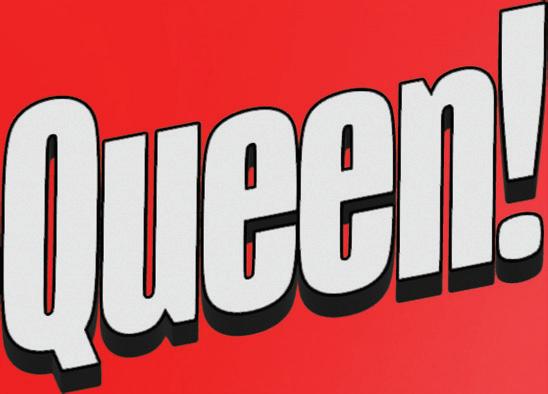

continued from p. 32
I met Jamie in the marketplace of approved vendors on the first day of the Gathering. This was her fifth Gathering but her first as a business owner. Like Spazz, she’d grown up with parents who struggled with addiction. Coming of age in Dallas, she had an uncle who was into punk and ICP, and he introduced her to a community she was missing at home. At 15, she had a child, so she got a job and an apartment. Now 28, she runs a company called D-Town Jewelers with her soon-tobe-husband, Par ker. They’ve grown it from an online-only operation making automotive rims to a storefront making custom grills and jewelry. (They’ve even made grills for ICP.)
Parker has been 11 years sober thanks to his juggalo family, and Jamie says she learned the structures and skills necessary for parenting from her juggalo peers.


When Jamie’s son turned 13, he expressed interest in joining her and Parker at the Gathering. She explained to him what happens there, what she’d expect of him, and what she couldn’t protect him from, like nudity or unsavory comments from strangers. Did he still want to go? He thought on it for a few days, then said, “Mom, I don’t think I’m ready.” She’s excited when he is, though, not only to pass on the tradition but also to get him o his phone.
“I haven’t used my phone while I’m out here,” she explained. “The signal’s not strong for everyone out here, and I’m sure plenty of people’s phones have already died. You know where your friends are, and you know where to find things to do, so what do you need the Internet for? It’s a good reset. Also makes you appreciate the good things when you get home—like air-conditioning!”
Kyle was easy to notice at the Gathering. I saw him on the first day, on a stage beside a small tent hosting what I can only call a “competitive endurance hotbox,” because he was wearing an enormous suit of homemade Warhammer-style armor and stilts.
Kyle has been coming to the Gathering for 14 years. Initially, he was drawn to the hard partying, but he’s stuck with it for the family elements. In his view, the family started coalescing in 1998, when ICP assembled the supergroup Dark Lotus (originally a five-piece with ICP, Twiztid, and Myzery). Not long after, he was in Philadelphia for a party and got jumped. His traveling companions abandoned him, but some people on their way to a Dark Lotus show noticed.

“They pulled up and were like, ‘You OK? You good?’ They literally saved my ass and o ered
me a ride home, but they were on the way to a concert. They asked if I wanted to go, and then they bought a ticket for me and decked me out. I had never been welcomed like that. Nobody knew me, but they were treating me like we’d been homies for a very long time. After that, I started noticing all the family elements at the Gathering. I gradually lost interest in the partying.”
Many juggalos feel that the 2017 breakup of the Dark Lotus—and the five years of drama that preceded it, including Twiztid starting their own label, fighting for their masters, and poaching Psychopathic rapper and in-house producer Young Wicked—fractured the family in a way it’s still recovering from. Kyle says he’s noticed an uptick in gatekeeping behavior since then—arguments over what’s “true” juggalo versus ju shit (“ju ” means “poser”) and debates about whether people are getting down with the clown in the right way.
Some people claim that true juggalos don’t listen to Twiztid anymore, for example, or insist that a particular year’s Gathering was the last “real” one. In response to all this, last year Kyle made his armor suit from foam and other materials and detailed it with band names, juggalo symbols, and Psychopathic Records references. He added the stilts this year. He calls the character “the Gatekeeper,” but it’s meant to inspire people to use their creativity to serve and entertain their community.
“People are forgetting the older traditions,” Kyle said, “which remind us of the love that we have as a group.”
When I arrived at the Gathering, I already knew who Emily was. I’d been in touch with
her before leaving Chicago, because the photographer who worked with me on my International Mr. Leather story in June knew she was going to the Gathering. She’s a journalist too, and she turned out to be camping near Kyle.
“The juggalos are everything punks wish they were,” Emily said. “I got into this in late elementary, early middle school, and then I got into riding freight when I was 20. I never felt like I fit in in the punk scene. I’ve always felt isolated in that scene in some way. I’ve been fat for most of my life. That’s one thing here—fat women here are celebrated, unlike in a lot of other subcultures. But punks stand on things like anarchy, community, mutual aid. . . . That stu does happen, but I think for juggalos, it happens more naturally because of class stu . There are a lot of punks who have really sheltered views and haven’t had to think too much about other people’s experiences of the world, but juggalos are the true working class. That’s where mutual-aid movements start. That’s why this group functions as a family.”
The Insane Clown Posse are so dopey, wild, and profane that it’s easy to overlook the things that go right in the community they’ve nurtured. All the persecution and derision have only made the bonds among fans tighter. ICP’s songs are all over the map in tone—“Juggalo Juice” is a goofy ode to Faygo, while “Your Rebel Flag” strenuously disavows the Confederate flag and all racists—but all of them work to reinforce the connections that keep juggalo values strong.
ICP have apologized for homophobic lyrics in their early songs and made a point to cel-
ebrate their queer fans. Violent J’s teenage daughter is a furry, and he’s stood up for her in ICP’s Snakebusters videos and gone to a furry convention with her. When ICP hold food drives, they encourage people to donate good food, not just stu they don’t want. That attitude is part of why, when you look through a free box at the Gathering, you can find an unopened dildo beside a gently loved copy of Peggy Orenstein’s Schoolgirls
The 2010 video for the ICP song “Miracles” has become a bottomless fount of Internet memes (“Fuckin’ magnets: How do they work?”), but as silly as it is, it’s also sincere. The openness and curiosity it expresses are the same openness and curiosity with which juggalos welcome anyone who comes to them in good faith. They embody a spirit of freedom that combines the anti-authoritarianism of punk and heavy metal with the PLUR philosophy (peace, love, unity, respect) of rave culture. It’s about dropping your inhibitions to free yourself and looking out for other people to help them stay free. In practice, this spirit means that sometimes you’re in a ring trying to punch someone. Other times, you’re taking the punch. In the end, it’s all love—much muthafuckin’ wicked clown love. v
mcaporale@chicagoreader.com
SHED THE SALT SHED THE SALT SHED THE SALT SHED THE SALT SHED THE SALT
SHED THE SALT SHED THE SALT SHED THE SALT SHED THE SALT SHED THE SALT SHED THE
SALT SHED THE SALT SHED THE SALT SHED THE SALT SHED THE SALT SHED THE SALT SHED
SALT SHED THE SALT SHED THE SALT SHED THE SALT SHED THE SALT SHED THE SALT
SHED THE SALT SHED THE SALT SHED THE SALT SHED THE SALT SHED THE SALT SHED THE
SALT SHED THE SALT SHED THE SALT SHED THE SALT SHED THE SALT SHED THE SALT SHED
THE SALT SHED THE SALT SHED THE SALT SHED THE SALT SHED THE SALT SHED THE SALT
SHED THE SALT SHED THE SALT SHED THE SALT SHED THE SALT SHED THE SALT SHED THE
SHED THE SALT SHED THE SALT SHED THE SALT SHED THE SALT SHED THE SALT SHED
SALT SHED THE SALT SHED THE SALT SHED THE SALT SHED THE SALT SHED THE SALT
SHED THE SALT SHED THE SALT SHED THE SALT SHED THE SALT SHED THE SALT SHED THE
SHED THE SALT SHED THE SALT SHED THE SALT SHED THE SALT SHED THE SALT SHED
SALT SHED THE SALT SHED THE SALT SHED THE SALT SHED THE SALT SHED THE SALT
SHED THE SALT SHED THE SALT SHED THE SALT SHED THE SALT SHED THE SALT SHED THE
SALT SHED THE SALT SHED THE SALT SHED THE SALT SHED THE SALT SHED THE SALT SHED
THE SALT SHED THE SALT SHED THE SALT SHED THE SALT SHED THE SALT SHED THE SALT
SHED THE SALT SHED THE SALT SHED THE SALT SHED THE SALT SHED THE SALT SHED THE
SEPT 9 WEEN

SEPT 10 CAKE
SEPT

SEPT 10 KAYTRAMINÉ
SEPT CAAMP
14 & 15
SEPT 21 BAD OMENS


SEPT 22 BISHOP BRIGGS AND MISTERWIVES

SEPT 23 DEATH CAB FOR CUTIE AND THE POSTAL SERVICE
SEPT 24 SQUEEZE AND THE PSCHEDELIC FURS


SEPT 25 EXPLOSIONS IN THE SKY

SEPT 16 GUSTER AND NEKO CASE
SEPT 17 DRIVE-BY TRUCKERS AND THE JAYHAWKS WITH AMERICAN AQUARIUM


THE SALT SHED THE SALT SHED THE SALT SHED THE SALT SHED THE SALT SHED THE SALT
SHED THE SALT
Recommended and notable shows with critics’ insights for the week of August 10

Cindy Lee Freak Heat Waves open. 8:30 PM, Constellation, 3111 N. Western, $20. 18+
On most of her records, Cindy Lee provides every note of her songs. Her self-released fifth album, 2020’s What’s Tonight to Eternity? (my favorite so far), includes her brother Andrew Flegel on drums, but her presence remains front and center: She’s the frazzled, anguished guitar wails that fade to a whimper at the end of “I Want You to Suffer.” She’s the low, mechanical grind of the drum machine punctuated by sensuous whispers of synthesizer on “Lucifer Stand.” She’s the reverb that refracts her voice into fading echoes as it glides and croons across every track.
Cindy Lee is the solo project of Patrick Flegel, former front person for defunct Canadian indierock band Women. The persona is as crafted as each lyric and note—it’s the so er, sadder ghost of a formerly composed woman, now decomposed and reaching out. Lee packages the heartbreak of Patsy Cline and the girl-pop glamour of the Supremes in the stage presence of a faded photocopy of PJ Harvey. The austerity of her lo-fi aesthetics—audible in her songs and apparent in the look of her music videos and GeoCities website—underscores the haunting beauty of the project’s romantic spirit.
HORSEGIRL, LIFEGUARD
Sun 8/13, 7:30 PM, Thalia Hall, 1807 S. Allport, $20. b
IN NINA CORCORAN’S recent Pitchfork Rising profile of Chicago postpunk trio Lifeguard, guitarist-vocalist Kai Slater described what draws together the teenagers in their Hallogallo scene. “It feels like everyone involved is really desperate to make music,” Slater said, “like it’s not a choice, but their natural role.” This sense of necessity invigorates the high-wire tension and mercilessly propulsive throb of Lifeguard’s new EP, Dressed in Trenches. It’s their debut for venerable New York indie Matador, which released it last month packaged with the band’s 2022 EP Crowd Can Talk (originally on local label Born Yesterday). Brief
but scorching, Crowd Can Talk proves that Lifeguard can cram a lot of life into 17 minutes, and they’ve powered up that skill on Dressed in Trenches. This version of Lifeguard is a little sharper and (when it’s called for) a little more restrained—on “Shutter Shutter,” for example, drummer Isaac Lowenstein plays just one simple, minimal part, hammering steadily at his kit as though he’s controlling thunder. And on “17-18 Lovesong,” when Slater’s wordless coo sails through the dry half-spoken vocals of bassist Asher Case, it makes for a hook as sticky and memorable as anything called “pop” these days. —LEOR GALIL
Opening Thursday’s show are British Columbia electronic-pop duo Freak Heat Waves, touring with Lee in support of their brand-new fi h album, Mondo Temple (Mood Hut). Lee makes a cameo on the sparse, house-infused “In a Moment Divine,” whose sparkling atmospheres stand out on a record that’s otherwise as funky as it is contemplative. Between these two artists, this concert promises the best soundtrack for hip swaying and heartbreak you’ll find in the city that night.
The Gories See also Sat 8/12. Glyders and the Stools open. 10 PM, Empty Bottle, 1035 N. Western, $25. 21+
When the Gories emerged in Detroit in 1986, on the tail end of the decade’s garage-rock revival, they seemed to have learned from every mistake made by other bands. They produced a sort of platonic ideal of the form: wild, messy, uninhibited, and fortified with the survival instincts of an alley cat. The trio’s swagger was redolent of 50s rockabilly, blues, and R&B but timeless enough to endure the winds of changing fashion; you could pick them up out of any decade since the birth of rock ’n’ roll and set them down in any other, and they’d carry on unperturbed. That natural cool is rare, and the Gories made it look easy.
Guitarists and vocalists Mick Collins and Dan Kroha and drummer Peggy O’Neill got their start in Michigan’s 80s mod scene and made their fulllength debut as the Gories with Houserockin’ in 1989. They quickly became cult darlings and even drew notice beyond the underground—their sec-
ond album, 1990’s I Know You Fine, but How You Doin’ , was produced by Alex Chilton. By the time they broke up in 1992, they’d created a huge wave of influence that continues to inspire new generations of garage rockers and punks.
The members went on to other bands, including the Dirtbombs, the Demolition Doll Rods, ’68 Comeback, and the Wolfmanhattan Project, but they never lost touch with each other musically; Collins and Kroha notably played together backing Chicago R&B legend Andre Williams on the magnificently raw, filthy 1998 record Silky. Still, the Gories remained in stasis until 2009, when they came together for a couple of reunion tours and discovered that the band’s fandom had grown stronger in their absence. Like many underground legends of their era, they played for larger audiences upon their return to the stage than they had on their first run. They reunited again in 2014 for even bigger crowds, and the following year they released their first single since 1995, the gloriously greasy “Be Nice” (Third Man). Though the Gories’ recordings are always a delight, they’re more of a singles outfit than an album band, and their live show has always powered their popularity. These performances at the Empty Bottle (one of the band’s natural habitats) ought to whip up the spiritual vibes of a rock ’n’ roll tent revival.
 —MONICA KENDRICK
—MONICA KENDRICK
The Gories See Fri 8/11. Skip Church and the Stools open. 9 PM, Empty Bottle, 1035 N. Western, $25. 21+
Psycroptic Decrepit Birth, Wounds, and Auraboros open. 8 PM, Reggies Rock Club, 2105 S. State, $20. 17+
The core of Australian four-piece Psycroptic is two prolific Australian brothers, drummer Dave Haley and guitarist Joe Haley, and they’ve been bashing out clotted tendrils of technical death metal with their main project for nearly a quarter century. The band’s early self-released albums are defined by charismatic vocalist Matthew “Chalky” Chalk, who alternated between bloody gurgles and more or less interpretable hardcore shrieks. When Chalky departed in 2005, straightforward bellower Jason Peppiatt took over as front man, and since then Psycroptic’s production values have scaled up. Though their ridiculously complex song structures haven’t changed, their recent albums have a polished, apocalyptically focused sweep. The tracks “Enslavement” and “The Prophet’s Council” on last year’s Divine Council (Prosthetic) manage to make blackened death sound as anthemic as power metal—they can induce such vigorous headbanging that by the time they’re over, you’ll be unsure if you’re sailing a Viking warship on your way to smite your enemies or being pulled into the abyss by eldritch entities who will devour you for the rest of eternity. Either way, the Haley brothers are a dual wonder of technical prowess; as they race each other for land-speed records, Joe’s guitar clangs so brutally that it basically becomes a second percussion instrument meshing with Dave’s fiendishly eloquent flurry of drumbeats. This show gives you the
chance to experience Psycroptic’s reliably unrelenting adrenaline rush in the flesh.
—NOAH BERLATSKYReplicant Comfort Cure, Vivid Vessel, Bex Soulia, and DJs Patrixia and Echodroides open. 8 PM, Cobra Lounge, 235 N. Ashland, $15. 17+
Replicant are a Chicago three-piece who make dark, sleek synth-pop that could score a blockbuster dystopian epic as easily as it could provide a scuzzy, sensual soundtrack for an all-night subterranean club. The group’s members—brothers Jordan and Justin DeLay and longtime friend Garrett Vernon—moved here separately from Michigan and formed Replicant in 2012, and they’ve since carved out a place in the city’s darkwave and postpunk scenes. Despite the futuristic, otherworldly vibes in their music, Replicant are concerned with the here and now. In 2019, the band compiled two EPs, 2017’s The Reckoning and 2018’s The Resistance —which condemn the Trump administration— into the full-length A Taste of Midnight . The title track of The Resistance (originally released just before the 2018 midterms) is a shimmering highenergy anthem that could rally the dejected and apathetic to fight unchecked power, corruption, and lies. In May, Replicant released two tracks from an album due later this year; the slinking industrial throb of “Hellbound” contrasts nicely with the New Order-flavored melody and propulsive swagger of “Heavensent.” This concert was going to be Replicant’s first live appearance in more than three years, but last month the Cult tapped them to open their Peoria date. This is still the trio’s long-overdue return to Chicago stages, though, and any Replicant show is a perfect excuse to embrace the darkness.
—JAMIE LUDWIGTrio Imagination 8 PM, Elastic Arts, 3429 W. Diversey #208, $20. b
Drummer Andrew Cyrille (born 1939) and double bassist Reggie Workman (born 1937) have worked with many of the most profoundly influential figures in post-1950 jazz; a short list of artists with whom one or both musicians have recorded includes Art Blakey, Alice and John Coltrane, Lee Morgan, Cecil Taylor, Marion Brown, Peter Brötzmann, Mal Waldron, and Yusef Lateef. Perhaps their most enduring association, though, is with each other. Workman, Cyrille, and alto saxophonist Oliver Lake realized in the late 1980s that they were hiring each other so o en that they might as well form a band. That joint venture, Trio 3, carried on until February 2022, when Lake retired from performance. But two months later, Workman and Cyrille played a concert with Cuban pianist David Virelles (born 1983) that went so well they decided to turn their collaboration into another band, Trio Imagination. Though Virelles is less than half the age of either of his bandmates, he’s a fitting recruit for several reasons. Trio 3 o en worked quite profitably with guest pianists, including Geri Allen and Jason Moran, and Virelles had already forged a partnership with Cyrille in the drummer’s quartet—it’s yielded one album, 2021’s The News (ECM). Virelles shares his venerable new partners’ inclusive approach to music, which relates challenging improvisational and compositional approaches back to the fundamentals of jazz tra-

continued from p. 37
dition. Trio Imagination have only played a handful of shows, and they haven’t made a record yet. This concert is a rare chance to catch them while they’re still a young band. —BILL
 MEYER
MEYER
Hey, ILY Michael Cera Palin headlines. Hey, ILY; Bottom Bracket; and Life Looks Good open. 8 PM, Sleeping Village, 3734 W. Belmont, $18, $15 in advance. 21+
In the Bandcamp credits of their 2022 full-length debut, Psychokinetic Love Songs (Lonely Ghost), Montana indie-emo band Hey, ILY snuck in what looks like a mission statement. Lead guitarist Trevin Baker and front man Caleb Haynes mention their instruments, of course, but also their “average” or “above average” skill at Nintendo’s Smash Bros. add in the assorted credits for “dad jokes,” “sweater champion,” and “cool sunglasses,” and you get a good feel for the band’s obsession with video games and nonchalance about rock ’n’ roll conventions. Hey, ILY first got my attention with the 2021 EP Internet Breath , where Haynes’s processed screamo wails leap out of chintzy-sounding chiptune productions that deliver power-pop hooks and emo euphoria. I know he’s an actual human person melding chiptune with indie rock, but he might as well be a sentient video game powered by fifth-wave emo memes. On Psychokinetic Love Songs, Hey, ILY sound more like a real live band—the kind that plays DIY shows in hot, cramped basements dripping with condensation. As they’ve evolved, they’ve expanded their musical vocabulary in several directions. The title track careens between tempos and moods as it juggles overcaffeinated guitar riffs, blurts of record scratching, minimal jazzy drums, and a slowed-down bit of Madonna’s “Holiday” that’s fit for a vaporwave record—the group tie it all together with their goofy personality as much as their precise playing. Last winter Hey, ILY issued Friend Group From Hell , a two-song single whose harsh edges don’t disrupt the joyful energy that initially drew me in.
—LEOR GALIL
Lifeguard See Pick of the Week, page 36. Horsegirl headlines; Lifeguard opens. 7:30 PM, Thalia Hall, 1807 S. Allport, $20. b
Something is Waiting Cokegoat and DJ Chris Roo open. 9 PM, Empty Bottle, 1035 N. Western. 21+ F
When Something Is Waiting formed in 2016, the band consisted of five dudes whose stacked résumés included stints in several Chicago heavy favorites, and on their first few releases they focused on big, mean, chaos-bringing noise rock a la Unsane. Over the past few years, though, they’ve charted a new direction, trading in nihilistic bludgeoning for Sunset Strip swagger forged with a sonic sledgehammer of 90s metal. They’ve also streamlined into a trio: front man Eddie Gobbo (who The Clientele COURTESY
previously sang in Jar’d Loose and the Muzzler), guitarist William Thomas Fay, and drummer Idin Alexzander (Lavisher). The band’s brand-new full length, Absolutely (Learning Curve), feels like a bizarre hybrid of White Zombie and Guns N’ Roses, pairing high-gloss metallic guitar with Gobbo’s shrill, confrontational shrieks. The whole thing oozes attitude, and Gobbo sounds so fired up and rude that you definitely wouldn’t want to piss him off. No matter what kind of bad-vibes throwbacks you’re into, Absolutely has something for you: you get Nine Inch Nails-flavored industrial minimalism, high-gain nu-metal guitar riffs, hair-metal bravado, and obtuse aggression worthy of the Three One G Records catalog. Even though I’ve followed Something Is Waiting since the start, the concoctions they’ve schemed up on Absolutely came as a complete surprise to me—they’ve delivered a record so unexpected and weird that I can’t help but love every second of it.
—LUCA CIMARUSTIThe Clientele 8 PM, Lincoln Hall, 2424 N. Lincoln, $25. 21+

London psychedelic chamber-pop outfit the Clientele have been making their hushed, literate songs for 32 years, evoking peers such as the GoBetweens, the Le Banke, and Felt while maintaining their own baroque and brainy mystique. Earlier this year, they released an ambitious double LP, I Am Not There Anymore (Merge), which lead singer and guitarist Alasdair MacLean says is a loose concept album based on “the memory of childhood, but at the same time the impossibility of truly remembering childhood . . . or even knowing who or what you are.” It’s been in the works for several years, and recording sessions stretched from 2019 till 2022 due to the pandemic and the band’s desire to explore interests outside guitar-based rock music.
On I Am Not There Anymore , MacLean, bassist James Hornsey, and drummer Mark Keen do indeed stretch out to encompass jazz, modern classical, and pure electronics—most strikingly on the dissonant “My Childhood,” with its spoken word and prickly string scrapes. It sounds like something from a dark 1960s BBC television special or one of the more cathartic works by electronic composer Ruth White. Many of the album’s tracks are separated by short nocturnes of sparse piano or snippets of musique concrète, which make it feel like a proper song cycle.
Opener “Fables of the Silverlink” weds the classic Clientele sound with new elements, driving its gentle, velvety lead vocals (think folk-rock singer Al Stewart or Swedish balladeer Fon Klement), swooping cellos, cascading horns, intricately shimmery guitar, and Spanish-language guest singing with crackling, danceable breakbeats—a de ly executed hybrid of nostalgic and modern. On “Garden Eye Mantra,” ethereal melodies morph into ominous, fuzzy psychedelia; “Claire’s Not Real” is built around a bossa nova beat, a classy piano figure, and a soaring chorus that a young Cat Stevens might envy. “Lady Grey,” with its chiming strings, minorkey arrangement, and early Zombies vibe, could’ve been a groovy late-60s hit, while “Dying in May” recalls the bouncy postpunk pop of groups such as the Pale Fountains or Chameleons UK. The Cli-
entele close the second LP with the progressive “The Village Is Always on Fire,” whose snappy beat (think Can’s “Yoo Doo Right”), spoken lyrics about adolescence, samples of merry children, and strident, ELO-worthy cello make it a fitting conceptual capper.
In support of I Am Not There Anymore, the Clientele are playing their first U.S. tour in six years. The album’s material is transparently a studio concoction, so I wonder how the band will execute it live—a recent set list contained new tracks alongside old faves such as “Since K Got Over Me” and “The Age of Miracles.” The best way to find out, though, is to go to the show!
—STEVE KRAKOWSmushie Will Paquin headlines; Smushie open. 8 PM, Beat Kitchen, 2100 W. Belmont, $17. 17+
Smushie main man Austin Koenigstein (also half of Chicago duo Berta Bigtoe) plays psych-leaning indie rock whose relaxed, sun-dappled melodies will convince you he’s figured out the secret to an unbothered life. Radiant keys, limber bass,
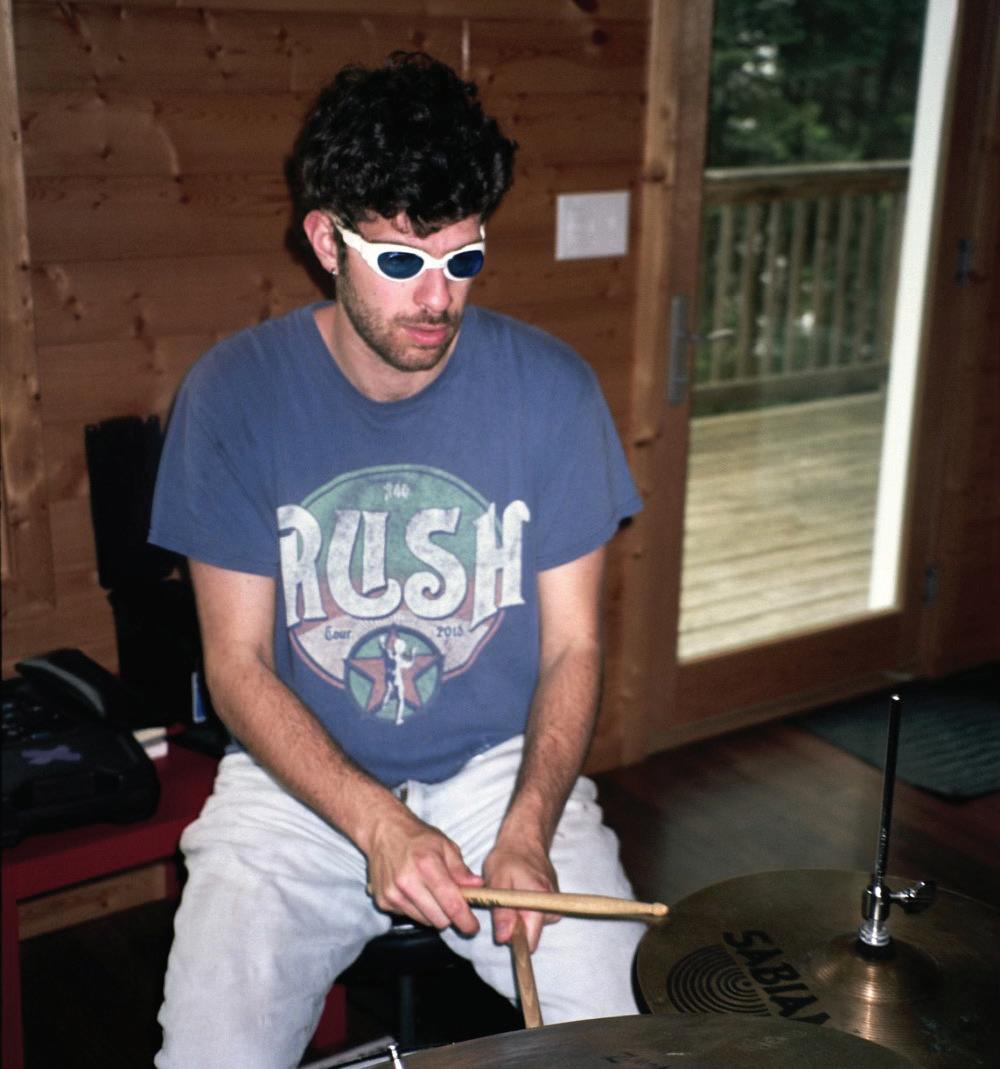
loose and understated guitars, and cool, in-thepocket drums float through Smushie’s latest album, June’s self-released Doofus Casanova, and Koenigstein arranges these elements in service of maximum chill. He pushes his voice into all sorts of odd corners, but whether he’s tightening his throat so it sounds like he’s sandpapered his larynx (“Tulip Schmaltz in A Major”) or dropping so far into his lower register that he sounds like he’s getting over a bad cold (“Kernel Shmegegge”), he always comes across as irreverent and playful. Koenigstein clearly just wants to have fun in service of a good song— until I heard the 42-second “Party of Three,” I never knew I needed nonchalantly deranged piano funk about eating at Applebee’s. —LEOR
GALILChance the Rapper Saba opens. 8 PM, United Center, 1901 W. Madison, $100-$196. b
Damn near every rapper has aspirations of “changing the game,” selling out arenas, and dominating hip-hop, but Chance the Rapper has already done that and then some. What could I possibly write
about the three-time Grammy winner that hasn’t already been written? What has Chance done that hasn’t gone viral? Even his supposed failures—the canceled tours, the litigious split from longtime manager Pat Corcoran, the widely unfavorable reviews of 2019’s The Big Day—could be interpreted as wins, depending on your perspective.
Many Chicago music fans remember the pandemonium at South Loop streetwear boutique Jugrnaut during Chance’s release party for his 2013 mixtape Acid Rap. We remember the lines around the corner at Metro for his shows, the seas of hats emblazoned with the numeral “3” (just like the one he famously wore at public events), his likeness on damn near every bus stop. Some of us closer to the indie hip-hop scene also remember the bright-eyed teenager who made a mixtape as a response to an out-of-school suspension and was quickly ushered into the local scene by some of Chicago’s brightest names, including the Cool Kids, Vic Mensa, and Ye. Yeah, Chance has been in the major league for a long time.
Along with Chief Keef, Chance blew up at a time when hip-hop needed an electric jolt, and we got it. His 2012 release #10Day is one of the best debut mixtapes in the genre, period. Acid Rap had a ground-shaking impact on the industry that can still
be felt today: a free mixtape by an unsigned rapper received the sort of accolades usually reserved for major-label releases (Pitchfork even named it a “Best New Album”) and drew huge sponsorships and big tour opportunities. Is it any wonder that so many artists were inspired to follow Chance’s example with their own careers?
In the years since, Chance’s trajectory has been simultaneously shocking and unsurprising. He’s done features with heavy hitters, including Justin Bieber, DJ Khaled, and Childish Gambino, and with 2016’s Coloring Book he became the first person to win a Grammy for a streaming-only release. And a er his 2019 appearance on Saturday Night Live, when he pulled double duty as host and performer for the second time, he’s cemented himself as a viable TV personality—he’s now a coach on NBC’s The Voice. And earlier this year, he teamed up with Mensa to launch the massive Black Star Line Festival in Ghana. Given Chance’s series of upcoming events around the tenth anniversary of Acid Rap, his special merchandise drops, and his recent teasers for new music, we can only guess what extraordinary tricks he’ll have up his sleeve in the future. But in the meantime, we can take the opportunity of this hometown arena concert to celebrate and reflect on an unparalleled career. —CRISTALLE
 BOWEN v
BOWEN v
night one featuring Raye Zaragoza, Keith Secola, Earth Surface People, Tres Hermanos Bautista 5:30 PM, Chop Shop F b
MON 10/9
Indigenous Peoples Day Chicago Arts & Music Festival night two featuring Novalima, Digging Roots, Opliam, One Way Sky, Hobawea Nahish 5:30 PM, Chop Shop F b
FRI 10/13
Astral Autumn Daze night one featuring Damon & Naomi, Powers/Rolin Duo, Spiral Galaxy, and more 8:30 PM, Hideout Circuit des Yeux, John Daniel 8:30 PM, Constellation, 18+
SAT 10/14
THU 8/24
D2G, Juice Mazelee, Magix King, F.A.B.L.E. 6 PM, the Promontory
FRI 8/25
Cultivate day one featuring Crumb, Andy Frasco & the U.N., Lucky Boys Confusion, Murphy’s Law, Mac Sabbath, Otnes 2 PM, the Nursery
Jonas Brothers 7:30 PM, Wrigley Field b
SAT 8/26
Cultivate day two featuring Record Company, Graveyard, Pharcyde, Black Lips, Brant Bjork, Goddamn Gallows, Dry Reef, Oux
2 PM, the Nursery
James Ivy, Georell Magno 8 PM, Schubas b
P1nkstar, Agua de Rosas, Xtranjera 9 PM, Sleeping Village
Villapalooza featuring Kaina, Gino Rockin Romo, Crudos
2.0, Los K-Bros, Mila La Morena, Mitzy Lucerito, Jesse De La Peña, Rai, Mariah Colon, Through N Through, Los Skin, Demo Division, Presto, Rampage, Fantasma Negra, and more Noon, W. 26th St. at Central Park F b
SUN 8/27
Cultivate day three featuring GZA & Phunky Nomads, Julian Marley & the Uprising, Earthless, Fishbone, Afroman, Crombies, Highball Holiday, Vic Mensa
2 PM, the Nursery
Nox Novacula, Black Cross Hotel, Feral Ghosts 8 PM, Burlington
WED 11/1
Leah Senior 8:30 PM, Hideout
THU 11/2
Sun Ra Arkestra 8:30 PM, Constellation, 18+
FRI 11/3
Lil Yachty 7 PM, Aragon Ballroom b
Sun Ra Arkestra 8:30 PM, Constellation, 18+

TUE 8/29
Kali Masi, Pity Party, Avery Springer 8 PM, Schubas, 18+
WED 8/30
Así Así 7 PM, Tack Room F
THU 8/31
Premo Rice, King Joe, AyeJae 7 PM, the Promontory
FRI 9/1
Precocious Neophyte, Basically Nancy, Dreamend
9 PM, Sleeping Village
SUN 9/3
Aja Monet 8:30 PM, Constellation, 18+
TUE 9/5
Home Entertainment, Heet Deth, Repent 9:30 PM, Sleeping Village
THU 9/7
DPCD, Jesse in Grey 9 PM, Hungry Brain
FRI 9/8
Conway the Machine, Sauce Walka, Jae Skeese 8 PM, Patio Theater b
SUN 9/10
Lil Tracy, Fish Narc, Hi-C, DJ Nedarb 8 PM, Patio Theater b
TUE 9/12
King 7 PM, House of Blues b
THU 9/14
Janelle Monáe 8 PM, Aragon Ballroom, 17+
FRI 9/15
Karol G 7 PM, Soldier Field b Bill Nace & Haley Fohr, Alison
Chesley & Steve Marquette
9 PM, Hungry Brain Wrecks, Worry Club 10 PM, Cobra Lounge, 17+
SAT 9/16
Black Angels, Convert 10 PM, Chop Shop, 18+
Bill Nace & Haley Fohr 9 PM, Hungry Brain Snowbeasts, Freeze Etch, Digital Gnosis, DJ Veganinblack 8 PM, Burlington
THU 9/21
Lilly Hiatt 8 PM, Golden Dagger
FRI 9/22
Deeohgee 8:30 PM, Golden Dagger
SUN 9/24
Granular Death, Dead Hawk, Sanford Parker, Mark Solotroff 8 PM, Burlington
WED 9/27
Colleen 8:30 PM, Constellation, 18+
SAT 9/30
Venom Inc., Satan, Ringworm, 72 Legions 7 PM, Cobra Lounge, 17+
WED 10/4
Chappell Roan 7 PM, House of Blues b
SAT 10/7
Bitch, Crys Matthews 8:30 PM, Golden Dagger Chappell Roan 7 PM, House of Blues b
SUN 10/8
Indigenous Peoples Day Chicago Arts & Music Festival
Astral Autumn Daze night two featuring Kath Bloom, Charlie Schmidt, Tekla Peterson, International Disassociation of Aaron Dooley 8:30 PM, Hideout Colter Wall, Red Shahan 7 PM, Salt Shed, 17+
THU 10/19
T1 Fest night one featuring Flatfoot 56, Huntingtons, Take the Reins, Space Age Zeros, Sex Dream 7 PM, Reggies Rock Club, 17+
FRI 10/20
T1 Fest night two featuring Queers, Sack, Raging Nathans, Flamingo Nosebleed, Hospital Job, Winks
7 PM, Reggies Rock Club, 17+
SAT 10/21
T1 Fest night three featuring Teenage Bottlerocket, Methadones, Bollweevils, Capgun Heroes, Won’t Stay Dead, Stephens, Goodbye Sunshine, Rip Taylors 7 PM, Reggies Rock Club, 17+
MON 10/23
Semler 8:30 PM, Hideout
TUE 10/24
A Giant Dog 9 PM, Empty Bottle
FRI 10/27
Mary Lattimore, Jeremiah Chiu 8:30 PM, Constellation, 18+
SAT 10/28
Mary Lattimore, Jeremiah Chiu 8:30 PM, Constellation, 18+
Tinashe, Shygirl, Uniiqu3
8 PM, Aragon Ballroom, 17+
SUN 10/29
Karan Aujla 8 PM, Aragon Ballroom b
Oceans And 9 PM, Hungry Brain
THU 11/9
Leisure 8 PM, Chop Shop, 18+
FRI 11/10
Olivia Dean 8 PM, the Promontory b
SAT 11/18
Kota the Friend, Price 7 PM, Patio Theater b
WED 11/22
Josh Spinner, Garden Girl, Olivia Wexler, Reri 8 PM, Cobra Lounge, 17+
FRI 11/24
Apollo Suns, Groovy Louie & the Time Capsules, Dr. Unk 9 PM, Reggies Music Joint
SAT 11/25
Brujeria, Piñata Protest, No/ Más 7:30 PM, Reggies Rock Club, 17+
TUE 12/5 Cattle Decapitation, Immolation, Sanguisugabogg, Castrator 7 PM, House of Blues, 17+
SUN 1/21/2024
Enrique Guzmán 7 PM, Rosemont Theatre, Rosemont b
THU 4/4/2024
Laura Pausini 8 PM, Rosemont Theatre, Rosemont b

SAT 4/20/2024
Uli Jon Roth 8 PM, Reggies Rock Club, 17+
THU 5/30/2024
Luis Miguel 8 PM, Allstate Arena, Rosemont b
FRI 5/31/2024
Tim McGraw, Carly Pearce 7 PM, United Center b
TUE 7/9/2024
Niall Horan 7:30 PM, Credit Union 1 Amphitheatre, Tinley Park b v
DANNY GALLEGOS , who cofounded Cemetery in 2010 and fronted the Chicago death-rock band for its entire history, died on Thursday, July 27. “Danny had so many ideas. Too many,” says guitarist Dez Knuska , who became friends with Gallegos in 2007 because they went to a lot of the same punk shows. “He wanted to be the Sisters of Mercy and the Human League and Peter Murphy. He loved a good minor melody. What he lacked in music theory he made up for in enthusiasm and determination.”
Cemetery debuted with a 2011 demo and released their lone studio album, Wind and Shadows , in 2015. Knuska and bassist Sam Nigrosh remember Gallegos as a charismatic singer who could be both confrontational and earnestly friendly.
“If he slapped someone’s drink in their face during the set or something, I can guarantee that he’d be talking with them ten minutes after the set and they’d be best friends,” Nigrosh says. “One thing that made him unique is he cared about how the band looked. . . . In Chicago people seem to think that they should just wear what they wore to the hot dog stand onstage, and Danny said, ‘Absolutely not.’ He wanted to look cool—and he did. And it attracted people to the band and him.”
The group’s most recent show was in October 2021 at Oozing Wound’s Ooze Fest at the Empty Bottle. Cemetery had been working on a new album for five years—Knuska says they’d recorded 40 minutes of material but no vocals.
Gallegos will surely remain an influence on his bandmates, who cherish so much about who he was both onstage and off. “He was an incredibly kind and thoughtful person,” Nigrosh says. “He gave really great gi s and was not afraid to show and tell you how much he cared about you.”
“He made me really look at aesthetics and really listen to music that I would have otherwise dismissed,” Knuska says. “I will miss him for the rest of my life.” —J.R. NELSON
AND LEOR GALILGot a tip? Tweet @Gossip_Wolf or email gossipwolf@chicagoreader.com.





Make time to learn something new with music and dance classes at Old Town School! We offer flexible schedules for all skill levels both in-person and online.
Free concerts in Bloomington, Indiana













August 24
Molly Tuttle & Golden Highway
w/Henhouse Prowlers
August 25 45 Drive


August 26
Pridefest 2023











August 27



Sign up for classes today at
oldtownschool.org



Bloomington Symphony Orchestra
Great food and places to stay. It’s affordable, not too far, relaxing, and fun. Plan

fucked that teenager. And if you didn’t figure that out, it was because you didn’t want to figure that out until after you fucked that teenager.
But in fairness to you, WORSE, and at the risk of pissing off literally every other person reading this column—please, God, tear off my fingers—there are teenagers out there who look older than they actually are. We’ve all known 16-year-olds who don’t get carded when they buy beer because they look at least five years older. Some of us were those 16-year-olds. On the flip side, we all know 21-year-olds who look like they’re 16. Some of us were those 21-year-olds.
Maybe you’re just feeling a lingering sense of panic about how much trouble your dick could’ve gotten you into.
By DAN SAVAGEQ : I’m a single straight male in my 40s. I date women in their 20s-50s. I hooked up with a 21-yearold woman recently, which is the youngest age I’d consider dating. Except a er we had sex, she told me she was actually much younger than 21. I did not break the law. I live in a state which has a surprisingly low age of consent, and she is above it, but barely. This was not about me making assumptions about her age. She explicitly told me via text that she was 21, and that was the age she listed on the dating app where we matched. She looks 21. She told me she has a job, lives on her own, and shared several stories that would only make sense if she was 21. I realize now she made
some of this up. I cut off contact with her immediately.
Even though it’s not illegal, it still feels pretty bad. I honestly feel like crap. Even though what I did was not illegal, I honestly feel like maybe it should be. A lot of people would say I did something wrong by sleeping with a 21-year-old woman in the first place (or what I thought was a 21-year-old woman), or by not checking more carefully. (Should I have asked to see her ID or something? But someone lied to me, and I had sex I would otherwise not have had, and now I feel sick about it. I can’t eat, I’ve been drinking too much, and I just can’t shake this feeling that I’m the worst and that my life is somehow over. The
whole idea of sex seems disgusting to me now.
Is this as big a deal as I’m making it out to be? Is it appropriate for me to feel like something has been done to me, or am I just trying to feel like a victim? I didn’t think that there was anything wrong with dating a 21-year-old woman, and I’ve always tried to be ethical when dating women younger than me, but now I feel pretty sleazy about it. —WORRIES OVER RECENT SEXUAL EXPERIENCE
a: No one who read your letter—and no one reading my response—wants me to help you. No one wants me to write something that will make you feel better, WORSE, or less sleazy, because no one is rooting for
you to get back on the apps.
Sorry, WORSE, but people don’t have much sympathy for straight men in their 40s who claim to have accidentally fucked teenage girls. And that’s what we’re talking about, right? This girl was over the age of consent in the state where you live, WORSE, but just barely; and the age of consent in the state where you live is “surprisingly low.” So, this woman—this girl—was under the age of consent in other states. Which means she was 16 or 17 years old.
Now, most people will assume—most people will reasonably assume—that you, an experienced man in his 40s, should’ve been able to figure that out before you
“if” for most people—you deceived yourself. But you’re not asking people to vote on whether you’re allowed to feel awful about what you did (fucking a teenager) and/or what was done to you (being lied to by a teenager). You’re entitled to feel however you feel.
Something else we should all know by now: sometimes teenagers get on dating and hookup apps and lie about their ages. So, when an older person matches with someone who claims to be anywhere from 18 to 21—whether the older person is two years older or two decades older—it’s incumbent on the older person to make sure the younger person is not a minor.

And while there isn’t a lot of sympathy for straight guys who accidentally fuck teenage girls, if things went down the way you described them, WORSE, and you had sex you wouldn’t have consented to if you hadn’t been misled . . . then you have a right to feel violated. “Rape by deception,” obtaining someone’s consent to sex under false pretenses, is a hotly debated area of law, and cases likes yours—much older men fucking teenage girls—aren’t usually cited by advocates for making “rape by deception” a crime.
Very few people are going to see you as the victim, WORSE, and most people will feel that if you were deceived by anyone— and that’s going to be a big
On top of those awful feelings, WORSE, you’re also feeling a lingering sense of panic about how much more trouble your dick could’ve gotten you into. If you were in another state, or if this girl was a tiny bit younger, you could’ve wound up on a sex-offender registry. In the time that elapsed between finding out how young this girl actually was and googling the age of consent in the state where you live, WORSE, your life must have flashed before your eyes.
So, what do you do now?
Raise the fucking floor. If you stop hooking up with women under the age of, say, 30, your odds of finding yourself in this situation again—your odds of running the risk of arrest and imprisonment again—would plummet. And if you ever wind up matching with one of those rare 30-year-old women who looks like they could be 17, ask to see her I.D.
Q: I’m a 35-year-old cishet woman who just moved back to a big southern city. While I do want a committed partner eventually, all I want right now is something casual. I want some good PIV sex and to experiment with ass play, light bondage, and maybe attend a few sex parties. When I moved, I skipped the apps and met the first four men that I’ve slept with through friends. All four cishet men were in their midto-late 30s and each either had issues with keeping it up or came prematurely. I feel frustrated, disappointed,
Just like lichen, take it slow and let it grow.
CHRISTIAN BUEHNER/UNSPLASH

unsatisfied, and kind of guilty for feeling this way. If I’m going to keep sleeping with dudes in their mid-30s to mid-40s, are unreliable boners something I should expect? Is there any way to screen for this, or is sleeping with someone the only way to find out? If they do have issues lasting as long as I’d like, how do I let them know that I’m moving on without it being obvious that it’s because I want someone who can keep it up and last at least ten minutes? Is it OK that I’d rather move on to the next guy than try and have these potentially sensitive conversations when I only want something casual? Do you think I’d have better luck finding what I’m looking for on the apps? —HARDLY AROUSED RECENT DICKS
a: You don’t owe someone an explanation if you don’t wanna fuck them again. Ghosting on people is unnecessary and unkind, HARD, and casual sex partners are people, too. You can thank someone for their service without telling them why you aren’t interested in being serviced again. If a guy demands an explanation and you wanna give it to him, HARD, you can let him have it. And who knows?



Maybe he’ll tell you that he was nervous or that he only has erection or endurance issues with new partners or that he immediately ran out and got himself some Viagra after that night. If you wanna give him a second chance, you can. If he disappoints you again, you don’t have to give him a third chance. As for asking a guy in advance whether he can get or stay hard, HARD, that could induce the kind of performance anxiety that makes it harder for a guy who can’t get or stay hard. So, fucking around until you find the
guy or guys who can come through for you may be the better strategy. Also, you don’t have to wait to find a regular male partner before attending a sex party. Most sex parties don’t allow single men, but they welcome single women. The people you meet at a sex party will have expectations similar to your own—no one goes to sex parties looking for a serious commitment—and since you’ll be able to watch guys servicing other women, you’ll be able to see which guys get hard, stay hard, and last a while.







Q: I’m having an affair with a married man. (I know, I know.) And while this might seem counterproductive to my position, I am trying to convince him to ask his wife to renew their efforts at marriage counseling. Not because I think it could save his marriage—it might be beyond saving—but I think he needs to make an honest effort at telling his wife what he thinks and feels and needs, and it might be a safe space for that. They tried it before, he says, and the sessions became all about her, her feelings, her needs, and I don’t think he’s really voiced most of what he’s going through with her. Instead, I become the dumping ground for all that, and while I’m happy to help him, I’m not a trained therapist. I also think he should ask his wife to open the marriage, because from what he describes, he’s not ready to leave her yet. (Financial considerations.) And marriage counseling might be a safe space to approach the topic. How do I get him and his wife to make the effort, so I can stop being their de facto therapist? —MISTRESS IN MIDDLE







a: You can stop being their de facto therapist right now, MIM. You aren’t obligated to listen to your lover complain about his marriage until he starts seeing a marriage counselor with his wife again. Set a boundary: “Dumping in me is fine, dumping on me is not.”



And while you don’t mention how long this affair has been going on, MIM, I’m guessing it’s been going on for a while, seeing as you’re sick of being dumped on. (The dumping in must be pretty spectacular.) So, at this point, MIM, you’ve heard every complaint your lover has about his wife and his marriage a dozen times or more. You’ve patiently listened, you’ve lovingly consoled, you’ve fucking fucked . . . and now you need to tell your lover you’re done. Not done fucking him, done listening to him complain. You’re his mistress, not his therapist, and it’s unfair of him to expect you to play both those roles.








A word of warning: You’re pushing your lover, who says he doesn’t want to end his marriage, to get back into couples counseling and say a bunch of things to his wife that can’t be unsaid and that could wind up ending their marriage. If you’re hoping to go from side piece to queen consort—consciously or subconsciously—you don’t want your fingerprints on their divorce. The other woman is always at risk of being blamed, MIM, but if your lover takes your advice and his marriage collapses as a direct result, you could wind up with the blame, not the man. v
Ask your burning questions, download podcasts, read full column archives, and more at the URL savage.love. mailbox@savage.love











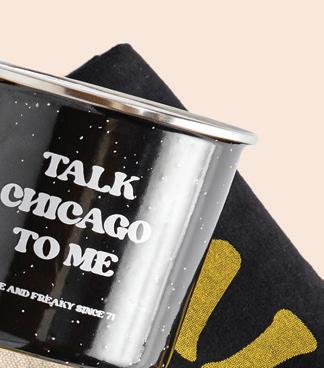
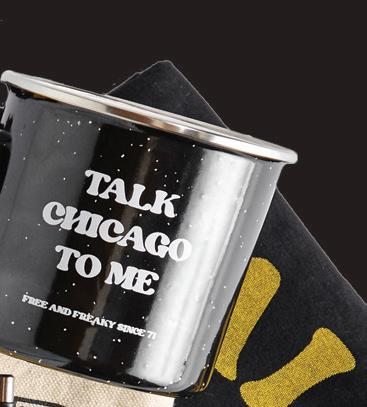












If you listed Lawndale Complex or the Lawndale Community Area on your Housing Choice Survey as a place you would like to permanently live, please read the information listed below.
The Chicago Housing Authority (CHA) is releasing the Proposed FY2024 MTW Annual Plan for public comment.
The 30-day public comment period begins July 24 and ends August 23, 2023. While CHA encourages and welcomes all program participants, residents, and the community-at-large to review the proposed updates to the FY2024 MTW Annual Plan you are not required to attend or view the livestream public comment hearings to submit comments. Your presence or absence does not a ect your housing.
The Draft Tenant Selection Plan (TSP) and Lease for Ogden Commons, a mixed-income community is available for review. The Chicago Housing Authority (CHA) has worked with its development partner to develop a Draft TSP and Lease for use at the private development known as Ogden Commons (previous site of the Lawndale Complex). The units within this development will be used as replacement public housing units for Lawndale Complex and the Lawndale Community area. If you listed Lawndale Complex/Lawndale Community area on your Housing Choice Survey as a place you want to live or maintain a right to return to new CHA replacement housing per the Relocation Rights Contract (RRC), you can comment on the Draft TSP and Lease during the 30-day public comment period.
The 30-day public comment period will be held for CHA to receive written comments starting April 7 through May 7, 2021. The Tenant Selection Plans (TSP) will be available on CHA’s website beginning April 7, 2021.
CHA will host three public comment hearings—two livestreams and one in-person:
• Livestream: Tue, July 25, 2023, at 2:00 pm











• Livestream: Mon, Aug. 14, 2023, at 11:00 am Go to www.thecha.org Live Comment Hearing (Sign interpreter will be present.)

Due to COVID-19, CHA has suspended all in person public meetings and instead, CHA will livestream one public comment hearing. The date and time of the public comment livestream hearing is as follows:
Tue, April 20, 10:00am: https://youtu.be/QBGG47BHXMg
• In-person: Tue, Aug. 8, 2023, at 6:00 pm, FIC 4859 S Wabash (Sign and Spanish interpreters will be present.)






We ask that comments pertaining to the TSP & Lease be submitted electronically to commentontheplan@thecha.org at least 48-hours prior to the comment hearing. Comments will be read live during the time outlined above. Comments received after the hearing will be added to the comment grid.
A summary and the full Proposed FY2024 Annual Plan will be available on CHA’s website at www. thecha.org beginning July 24. You may also mail or fax comments for the Proposed FY2024 MTW Annual Plan. All comments must be received by August 23, 2023.


Mail, E-mail or Fax comments to: Chicago Housing Authority





If you require translation services, please read the attached notice or check with your property manager for more details. Do not mail comments to CHA.
E-mail or Fax comments to: commentontheplan@thecha.org Fax 312. 913.7837


Attention: Proposed FY2024 MTW Annual Plan 60 E. Van Buren Street, 12th Floor Chicago, IL 60605
Email: commentontheplan@thecha.org | Fax: 312. 913.7837
Ifyouhaveaquestionaboutthisnotice,pleasecalltheCHAat312.913-7300.
Torequestareasonableaccommodation,pleasecall312.913.7062. TTY 866.331.3603





If you have a question about this notice, please call 312.913-7300. To request a reasonable accommodation, please call 312.913.7062. TTY 866.331.3603

JOBS
Sales/Biz Dev Representative-Chicago
Reader Sales representatives sell print, digital, and ad products to local businesses. Sales reps shoudl have 2 years of sales experience OR similar skills, & knowledge of media/advertising products. Ideal candidates will be familiar with CRM software & GSuite. Comp packages vary (full or part time), & include salary, commission, and health benefits. Diverse candidates encouraged to apply. This is an ongoing search. Send a resume to careers@chicagoreader. com.
Copy Editor- Chicago
Reader Chicago Reader is hiring a Copy Editor responsible for reviewing/revising content for accuracy & quality. Candidates should have a high level of accuracy/ attention to detail w/ exceptional written communication skills. 1 year of experience copy editing, proofreading, & fact checking, preferably for a media outlet, is required. Salary: $45-$50K. Benefits= Medical, dental, vision, PTO. Apply: http://chicagoreader. com/careers.
RESEARCH
HOUSING
PROFESSIONALS & SERVICES
AUDITIONS
COMMUNITY
MATCHES
PUBLIC NOTICE ADULT SERVICES
or rltd. Email resumes to:
Attn: Julia Savaneli - Ref # 0439, julia.savaneli@ wsp.com.

Vice-President-North America Vice-President-North America (Chicago, IL): Source candidates, business dev, Reqd. BS in Business Admin, LLB or related. Telecommute OK. Send resume to: Finlay James Associates, Sara Gaughan, 330 N Wabash, Chicago, IL 60611
thru Fridays 8-6, closed Sunday and Mondays. Rental and commission options are available. For more information call Kelli or Chris at 312-664-8710.
Inbound Specialist
Req’d: BA’s in Business Admin., Transportation and Logistics Mgmt. or related. Wage: $37,294/ Yr. Work Site: Wood Dale, IL 60191 Mail Resume: ALLSTATE INT’L FREIGHT USA INC., 1250 W Artesia Blvd., Compton, CA 90220
process simulation, process flow diagram CAD, and bench scale chemistry or chemical eng lab. Dir inquires to Institute of Gas Technology, 1700 S. Mount Prospect Rd., Des Plaines, IL 60018, Attn: A. Carter, HR.
Data Engineer/Analytics Data Engineer/ Analytics, Chicago, IL, for Aspen Dental Management, Inc. (ADMI): Partner with business, analytics, and engineering teams to design and build data structures to facilitate reporting, models, and monitoring key performance metrics. Req’d: Bach. (or foreign equiv.) in Comp. Sci., Data Sci., Mathematics, or related data or computational science field & 2 yrs. of exp. in IT, Data Analytics and/or Data Sci. OR Master’s (or foreign equiv.) in in Comp. Sci., Data Sci., Mathematics, or related data or computational science field. Also must have & demonstrated proficiency with: cloud native services, SQL, Python and/or other object-oriented programming language(s), & writing unit & integration tests. May work remotely twice a week. Resumes to code AA-DEA, J. Ximenes, ADMI, 800 W. Fulton Market, Chicago, IL 60607.
Sr. Lead Consultant, Project Management –(Chicago, IL) WSP USA
Inc.: Spprt biz dvlpmt & new proj pursuits by organizing tech teams & resources, estimating proj budgets, writing tech scope of work & cost proposals, & supporting client negotiations. Req’s a bachelor’s deg (or frgn equiv) in Civil Engg, or rltd. + 3 yrs. exp. Sr Proj Mgr, Construction Site Supervisor, Civil Engineer,
Senior Manager, Value Engineering (McCain Foods USA Inc., Oakbrook Terrace, IL): Dvlp & implmnt NA Value Eng (VE) sustainable cost advntage agenda; Spprt projct mgmt & governc for portfolio & pipeln of NA VE projcts; Lead teams in ideatn of cost savings opps for packaging, prcs eng & prodct formultn to imprv value propositn for business; Wrk w/ Mktg, Mfg, Procuremt, R&D, Sales, Ops & Finance for ideas & prep tech cases; Use projct mgmt & influencg skills to dvlp ideas into projcts; Collab w/ ingredient & packaging suppliers to drive prfmnc & eval prcs techgs to drive cost advntg; Bld relatnshps in org to dvlp projcts & prcses; Establsh knowlg of McCain prodct portfolio, prodct dsgn & mfg, mktg & sales stratgs, & raw mtl & finished good supply chains. Reqs exp w/: Exp in prcs techlgy rsrch & dvlpmt; commercializatn of prodcts, prcses & pkg; prcs optimiztn & line prodctvty, drive cost saving opps; tech projct mgmt, lead innovatn projcts w/ cross functnl teams; Exp in tech progrm dvlpmt/mgmt.
Reqs BS or frgn equiv in Chem Eng, Chem Technlgy, Food Technlgy, Food Prcs Eng, Food Sci or rltd fld & 7 yrs exp as Rsrcher & Dvlper or rltd occ in CPG Food & Bev ind. Optn to WFH partially. Travel req’d - 25% in US, Canada & Europe. Salary: $144,560 - $148,000.00. To apply online please visit https://careers. mccain.com/ reference number 596125.
Federal Home Loan Bank Chicago is seeking a Senior Risk Analyst in Chicago, IL. Review, maintain and upgrade risk management systems and perform quantitative analysis to assess changes and enhancements to pricing models within vendor applications. 2 days of on-site work per week required. May otherwise work remotely. Apply online at fhlbc.com/careers.
Barber and Stylist Gold Coast salon located on lake shore dr. is looking for a stylist and or barber to join their family. We are open Tuesday and Saturdays 8-4 and Wednesday
TECHNOLOGY ServiceNow Inc is accepting resumes for the following positions in Chicago, IL: Sr Mgr Software Engineer (2144-2219274): Manage a team and lead successful technical implementations. Telecommuting permitted.
Email resume to servicenowresumesUS@ servicenow.com. Or mail resume to ServiceNow Inc, Attn: Global Mobility, 2225 Lawson Lane, Santa Clara, CA 95054. Resume must include job title, job ref. # 21442219274, full name, email & mailing address. No phone calls. Must be legally authorized to work in U.S. without sponsorship. EOE.
Medical Physicist (noncertified) McKesson Corporation - Medical Physicist (noncertified) in Hazel Crest, IL. Participate in the specification, selection, and acceptance of radiation-producing machines, accessories, and computerized treatment-planning system. Must have: IEMA License permitting use of radioactive material in radiation therapy. To apply, please send resumes to JobPostings@McKesson. com. Reference #: 001748.
Engineer (Chemical) Support research portfolio of coal/biomass gasification, methane conversion programs, CO2 capture and utilization, combustion, and renewable energy tech incl solar thermal, hydrogen, and ammonia.
Duties: devel process models in Aspen or similar software; draft process flow diagrams, piping, instrument diagrams; size equipment; est project costs; hazard analysis on novel tech; pilot plant ops support; support proposal writing. Reqd: BS in degree in Chem Eng pls 4 yrs exp in gasification, methane conversion, CO2 capture, or hydrogen generation.
In lieu of BS pls exp, MS in Chem Eng pls 6 mos exp w software tools for
Lecturer Loyola University Chicago is seeking a Lecturer in Chicago, IL to teach introductory & upper-level courses in Geographic Information Systems (GIS) including Introduction to GIS, Advanced GIS, Remote Sensing; teach sophomore-level Environmental Statistics course. Please send res to chippert@luc. edu & ref job 072891.
Software Engineer @ Stripe, Inc. (Chicago, IL and various unanticipated locations across the US) Design, build, & maintain APIs, services, & systems across Stripes engineering teams using Ruby & Python. Job req’s Bachelor’s degree in Comp Sci or rltd &1 yr of software engineering exp. Salary: $146,500$198,100/year. To be considered, applicants must send resume to ad-reply@stripe.com ref job code 3661303.
Microbiology Analyst BioGenesis Analytical Inc is seeking an Microbiology Analyst to Quantitative and qualitative analysis of client samples, Perform quality control testing, and etc.. Position requires a Master’s Degree in Microbiology or related.; knowledge of biostatistics and biotechnology. Interested applicants can mail resume with code BGI23 to: BioGenesis Analytical Inc., 813 S Jefferson St, Chicago, IL 60607.
Charles Schwab seeks Senior Manager, Model Risk Oversight (Chicago, IL): Prfm modl validtns & make contrbtns to Modl Risk Ovrst tm ff guidlns based on SR 11-7, to incl assmnt of modl usage, docmntn, concptl soundnss, data intgrty, contrl envr & sw envr. Pos allws for 100% rmt work. Must live w/i reasnabl cmmtng dist. Reprts to co. offce in Chicago, IL. Reqs edu & exp. EOE. Salary: $126,381 - $246,800/yr. For full job details & to apply online, visit: https:// www.schwabJobs. com/ & search Req ID: 2023-93681.
Video Editor Beeline Group, LLC seeks a Video Editor. Mail resume to 1301 Lindmeier Rd. Elk Grove Village, IL.
ETL Developer Multiplan, Inc. seeks ETL Developer in its Naperville, IL location. Minimum
Requirements: Bachelor’s Degree in IT Data Management, Information Systems Technologies or a related field. Two years of experience in the position offered or two years of experience as an Infrastructure and Database Engineer/ Architect and/or DevOps Engineer. Prior experience must include building ETL processes using SSIS; working with large datasets using T-SQL; utilizing ETL principles; troubleshooting and analyzing complex code. Please send resumes to: Anthony Commorato, Anthony.Commorato@ MultiPlan.com.
DePaul University seeks Intermediate ERP Business Analysts/ Developers for various & unanticipated worksites throughout the U.S. (HQ: Chicago, IL) to analyze & design ERP sw apps in client/server & web-based enterprise app enviro for university web & Internet apps. Bachelor’s in Comp Sci or Info Systems/Tech or Computer/Computational field + 3 yrs exp req’d. Req’d skills: exp in higher ed enviro, analyzing, designing, testing ERP, incl SDLC, PeopleSoft sw apps, PeopleSoft data mining, working w/ customers to analyze reqs, Oracle Server, SQL, Application Engine, .NET, JSON, web service integrations, HTML, XML, XSLT, CSS, UI Design, PL/SQL, Visual Studio, C#, SQR, COBOL. Telecommuting permitted. Apply online: https://offices.depaul. edu/human-resources/ careers. Req ID: 1113
Senior Software Engineer (Chicago, IL) Design & implement software for manufacturing: MES & OEE software, ERP integration & Internal DevOp software. MS in Computer Sci/Electr. Engn, or a rel field & (3) years’ EXP in the job offer or a Rel. occupation. Req experience with Supporting the analysis, design, development & deployment of MES across the whole manufacturing plant. MS TFS, MS Visual Studio, .NET C#, SQL server, Siemens Simatic IT, Git. Travel is required. Resume to IT SOFT USA INC. 55 W. Monroe St. Ste 2575, Chicago IL 60603.
Solutions Engineer: (Chicago, IL) Mail CV to: Daisy Abela, Aura Alliance Inc, 125 S. Wacker Dr, Ste. 300, Chicago, IL 60606; or email daisy. abela@weareaura.com.
WANT TO ADD A LISTING TO OUR CLASSIFIEDS? Go to classifieds.chicagoreader.com
European Relax Massage InCall $85, Hotels $145 Cash
773 616-6969 Sports Massage, Deep Tissue, Swedish, and Ukrainian. 773 616-6969 Call:
10 am to 9 pm; no texts in my business.
1250/1234 S. Michigan Ave. Street/parking
ISO indie film actress ISO local actress for indie film shooting in Chicago/ Michigan over next year. 25-35 age range, BIPOC performers highly encouraged to audition.
FTM4M, 35 Seeks M4M
Gym Partner Hi, I’m looking for a gym partner to spot with, and to be safe in the gym with while working out. NOT LOOKING FOR A HOOKUP. I’m fat, FTM (trans man), Mexican who is very shy and very introverted. NO TRANSPHOBES NEED APPLY, ESPECIALLY CIS STRAIGHT MEN. Must have Planet Fitness card. Text only 872-529-0333.
CLEANING SERVICES
CHESTNUT ORGANIZING AND CLEANING SERVICES: especially for people who need an organizing service because of depression, elderly, physical or mental challenges or other causes for your home’s clutter, disorganization, dysfunction, etc. We can organize for the downsizing of your current possessions to more easily move into a smaller home. With your help, we can help to organize your move. We can organize and clean for the deceased in lieu of having the bereaved needing to do the preparation to sell or rent the deceased’s home. We are absolutely not judgmental; we’ve seen and done “worse” than your job assignment. With your help, can we please help you? Chestnut Cleaning Service: 312-332-5575. www. ChestnutCleaning.com
Have you had an unwanted sexual experience since age 18? Did you tell someone in your life about it who is also willing to participate? Women ages 18+ who have someone else in their life they told about their experience also willing to participate will be paid to complete a confidential online research survey for the Women’s Dyadic Support Study. Contact Dr. Sarah Ullman of the University of Illinois at Chicago, Criminology, Law, & Justice Department at ForWomen@ uic.edu, 312-996-5508. Protocol #2021-0019.
Free audition notices! The Chicago Reader is offering free auditions in our classifieds through Sept. 1. Create an account and your listing at chicagoreader.com/ auditions
All romantic dates women wanted All romantic fun dates all requests 24.7 Call (773) 977-8862 swm
Hot Couple ISO Hot Singles! Hot Couple successful 55 yrs young with fit physiques, ISO Beautiful Uninhibited people to eXplore New Horizons. Lakefront, Sailing, Nude Sunbathing, Biking. Intrigue us with a hot reply!
Two Males, 58 and 60, Seek Sexy Lady 50-65 Threesome Fun We are two friends who have done this before. We love lots of touching and oral!
MJM 52 SEEKS
FEMALE 50+PLAYMATE
MJM 52 SEEKS
FEMALE 50+WEEKEND PLAYMATE LIKES ANTIQUES WINE FLEA MARKETS HOT OIL AND ORAL MASSAGE BONDAGE SPANKING -224-292-9899.
MWM DOM SEEKS SUB MWF MWM DOM 52 SEEK SUBMISSIVE MWF AND WILL TRAIN PLEASURE AND PUNISHMENT BONDAGE SPANKING ORAL -224-292-9899.
Two Males, 58 and 60, Seek Sexy Lady 45-65 for Sensual Fun We are two friends who would love to please a woman together. We love lots of touching and oral!
MWM DOM SEEKS SUBMISSIVE FEMALE MWM DOM 52 SEEKS SUBMISSIVE FEMALE AND WILL TRAIN PLEASURE AND PUNISHMENT BONDAGE SPANKING ORAL CAN HOST CALL/ TEXT-224-292-9899.



Notice of Public Sale of Personal Property Notice is hereby given that pursuant to Section 4 of the Self-StorageFacility Act, State of Illinois, Chicago Northside Storage – Lakeview/Western Ave Storage LLC will conduct sale(s) atwww. storagetreasures.com by competitive bidding starting on June 8th and ending on August 23rd @ 12:00 pm on the premises where theproperty has been stored, which are located at Chicago NorthsideStorage 2946 N Western Ave. Chicago, IL 60618. 773-305-4000. In thematter of the personal property of the individual listedbelow, Chicago Northside Storage –Lakeview. Cian O\’Mahony P26 & H05, Nicholas Nowicki M27, Perry Marshall N12, Cesar Venegas O01, Jean Warner P27, Joshua Perez T172. Purchases must be made with cash only and paid at the time of saleredemption. All goods are sold as is and must be removed at the timeof purchase. The sale is subject to adjournment.






















Danielle’s Lip Service, Erotic Phone Chat. 24/7. Must be 21+. Credit/ Debit Cards Accepted. All Fetishes and Fantasies Are Welcomed. Personal, Private and Discrete. 773-935-4995




Direct to your door! Man and female all lifestyle’s and group marriage available escort models and belly dancers 24/6 outcall closed Tuesday. +1-312386-0622 (Hiring 21+) www.hbeas.ewaucu.us










